Organisational Behaviour Report: Unilever and Organizational Behaviour
VerifiedAdded on 2022/11/29
|17
|5655
|119
Report
AI Summary
This report provides a comprehensive analysis of organisational behaviour, focusing on the consumer goods company Unilever. It begins by defining organisational behaviour and exploring how organisational culture, politics, and power influence individual and team behaviour, using Handy's Culture Typology model to illustrate these concepts. The report then examines the impact of politics and different types of power (legitimate, reward, informational) within the organisation. Furthermore, the report delves into motivational theories, specifically content theories like Maslow's hierarchy of needs and Vroom's Expectancy theory, explaining how these theories enable effective goal achievement. The analysis extends to the characteristics of effective versus ineffective teams. Finally, the report discusses the practical application of organisational behaviour concepts and philosophies within Unilever, offering insights into its strategies and practices.
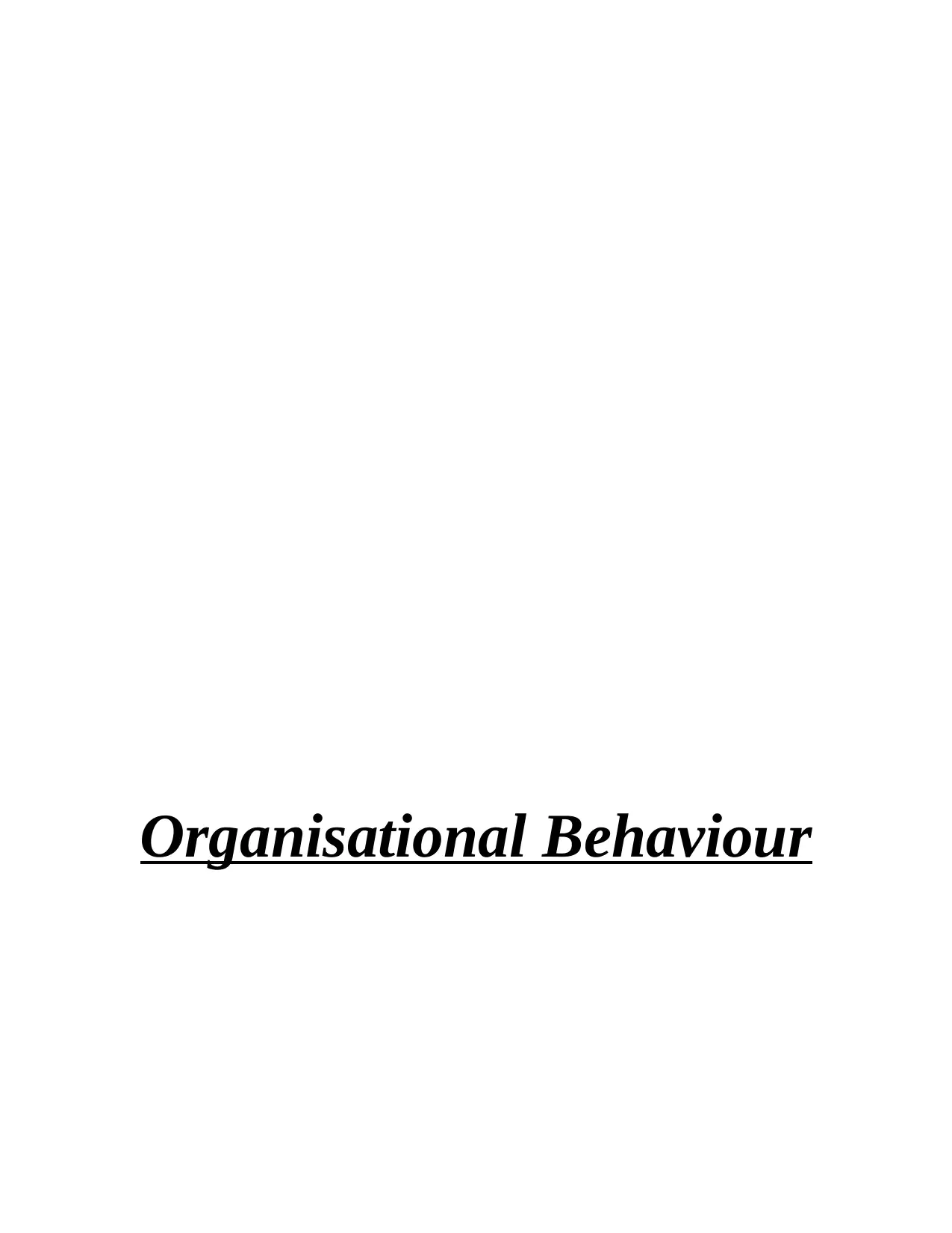
Organisational Behaviour
Paraphrase This Document
Need a fresh take? Get an instant paraphrase of this document with our AI Paraphraser
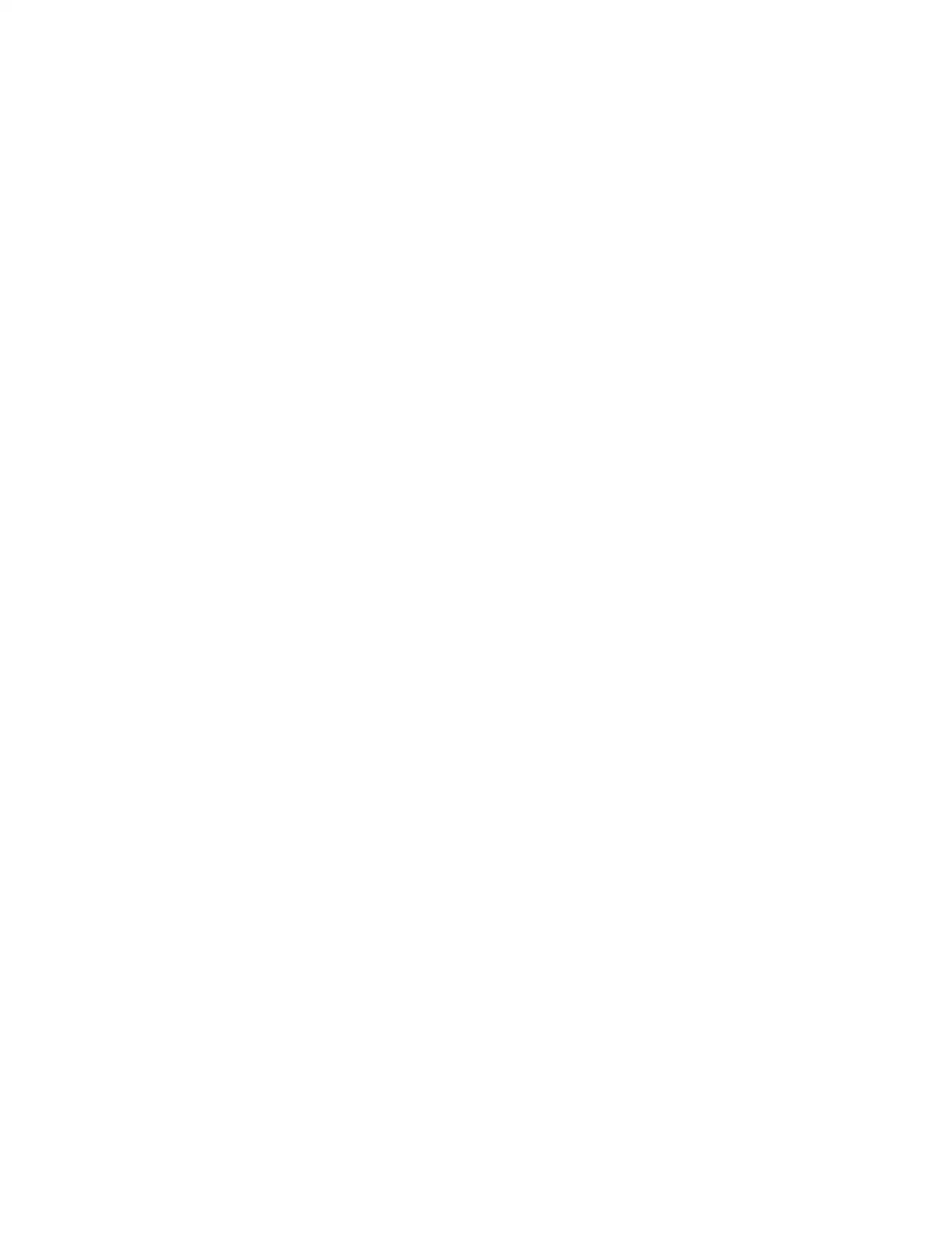
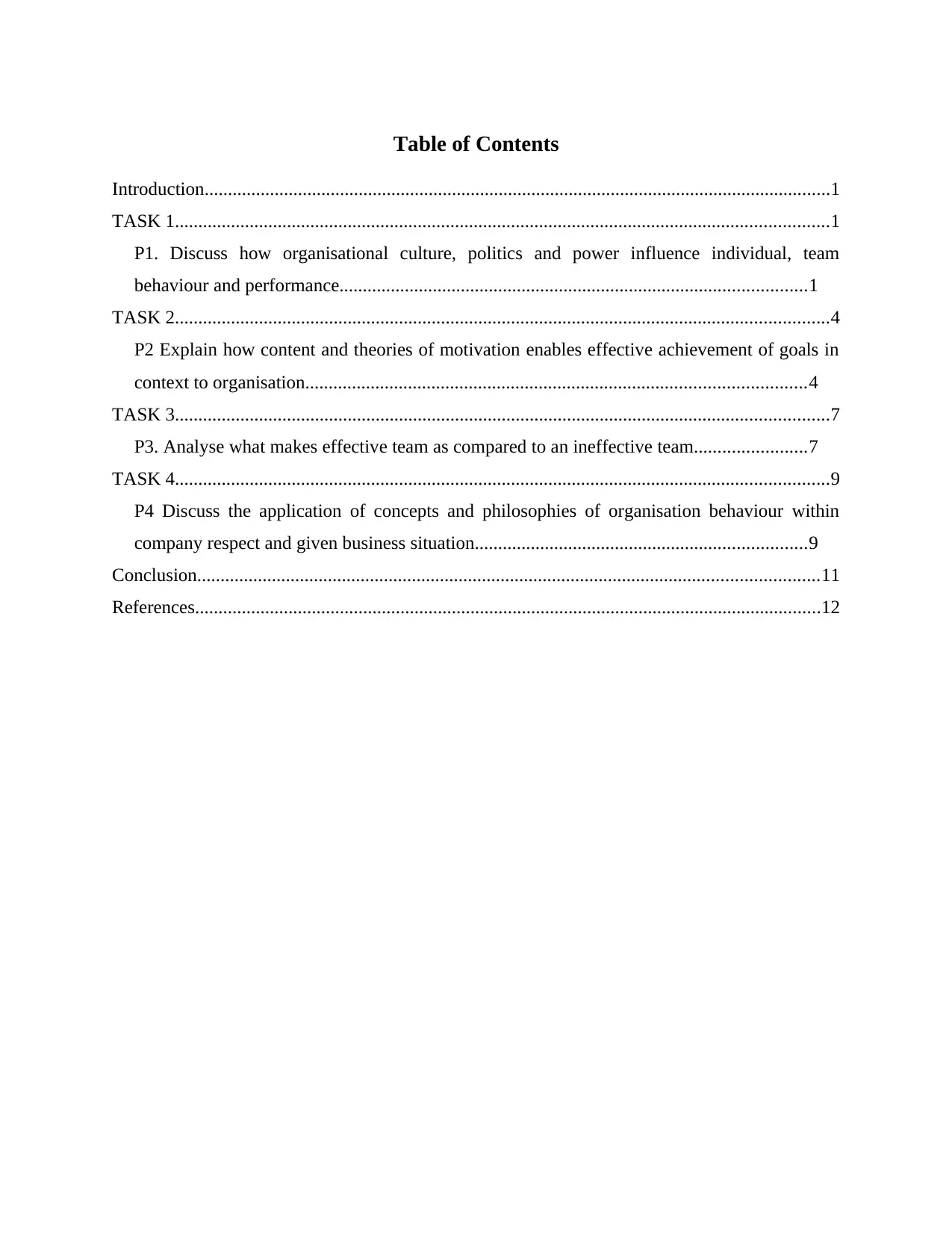
Table of Contents
Introduction......................................................................................................................................1
TASK 1............................................................................................................................................1
P1. Discuss how organisational culture, politics and power influence individual, team
behaviour and performance....................................................................................................1
TASK 2............................................................................................................................................4
P2 Explain how content and theories of motivation enables effective achievement of goals in
context to organisation...........................................................................................................4
TASK 3............................................................................................................................................7
P3. Analyse what makes effective team as compared to an ineffective team........................7
TASK 4............................................................................................................................................9
P4 Discuss the application of concepts and philosophies of organisation behaviour within
company respect and given business situation.......................................................................9
Conclusion.....................................................................................................................................11
References......................................................................................................................................12
Introduction......................................................................................................................................1
TASK 1............................................................................................................................................1
P1. Discuss how organisational culture, politics and power influence individual, team
behaviour and performance....................................................................................................1
TASK 2............................................................................................................................................4
P2 Explain how content and theories of motivation enables effective achievement of goals in
context to organisation...........................................................................................................4
TASK 3............................................................................................................................................7
P3. Analyse what makes effective team as compared to an ineffective team........................7
TASK 4............................................................................................................................................9
P4 Discuss the application of concepts and philosophies of organisation behaviour within
company respect and given business situation.......................................................................9
Conclusion.....................................................................................................................................11
References......................................................................................................................................12
⊘ This is a preview!⊘
Do you want full access?
Subscribe today to unlock all pages.

Trusted by 1+ million students worldwide
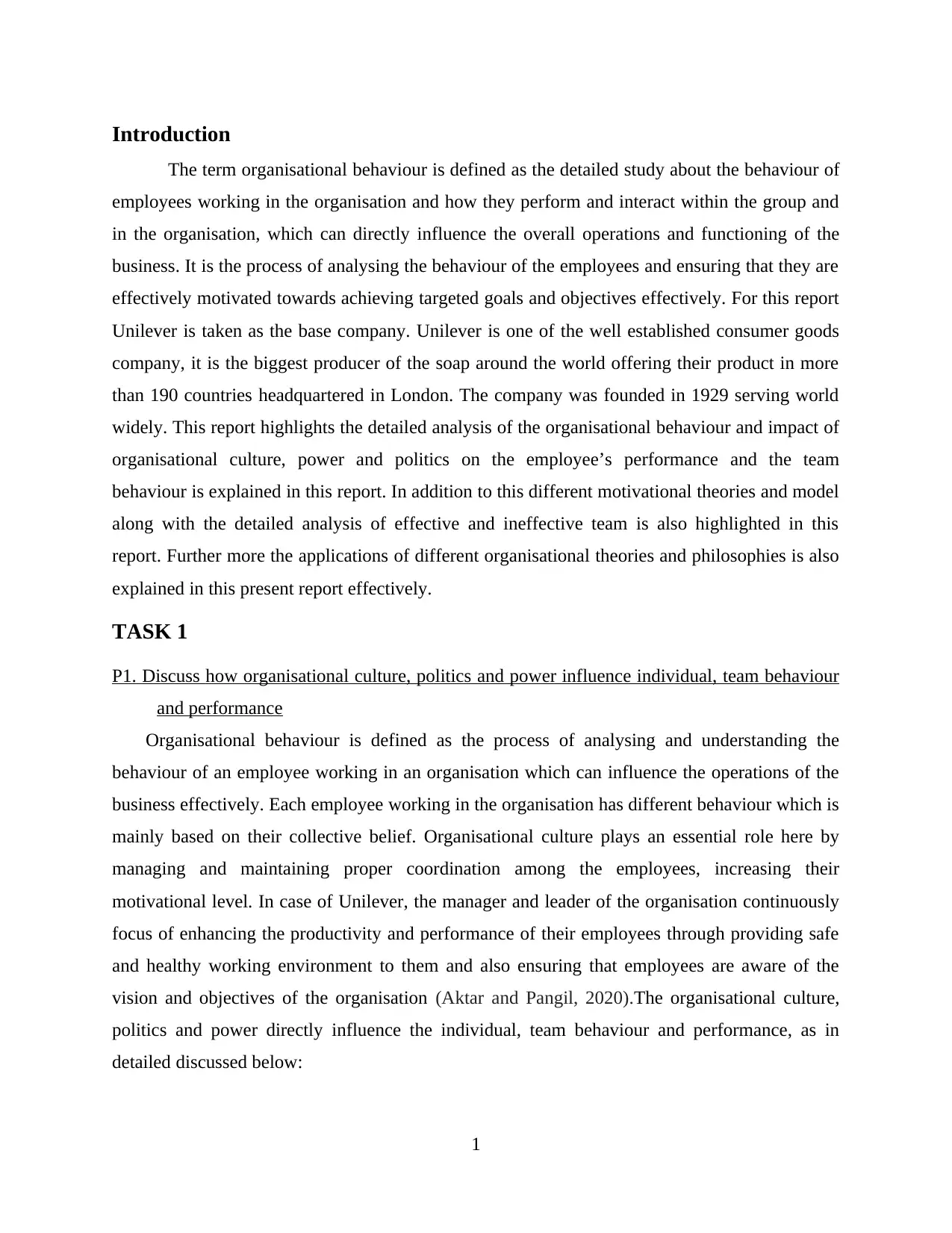
Introduction
The term organisational behaviour is defined as the detailed study about the behaviour of
employees working in the organisation and how they perform and interact within the group and
in the organisation, which can directly influence the overall operations and functioning of the
business. It is the process of analysing the behaviour of the employees and ensuring that they are
effectively motivated towards achieving targeted goals and objectives effectively. For this report
Unilever is taken as the base company. Unilever is one of the well established consumer goods
company, it is the biggest producer of the soap around the world offering their product in more
than 190 countries headquartered in London. The company was founded in 1929 serving world
widely. This report highlights the detailed analysis of the organisational behaviour and impact of
organisational culture, power and politics on the employee’s performance and the team
behaviour is explained in this report. In addition to this different motivational theories and model
along with the detailed analysis of effective and ineffective team is also highlighted in this
report. Further more the applications of different organisational theories and philosophies is also
explained in this present report effectively.
TASK 1
P1. Discuss how organisational culture, politics and power influence individual, team behaviour
and performance
Organisational behaviour is defined as the process of analysing and understanding the
behaviour of an employee working in an organisation which can influence the operations of the
business effectively. Each employee working in the organisation has different behaviour which is
mainly based on their collective belief. Organisational culture plays an essential role here by
managing and maintaining proper coordination among the employees, increasing their
motivational level. In case of Unilever, the manager and leader of the organisation continuously
focus of enhancing the productivity and performance of their employees through providing safe
and healthy working environment to them and also ensuring that employees are aware of the
vision and objectives of the organisation (Aktar and Pangil, 2020).The organisational culture,
politics and power directly influence the individual, team behaviour and performance, as in
detailed discussed below:
1
The term organisational behaviour is defined as the detailed study about the behaviour of
employees working in the organisation and how they perform and interact within the group and
in the organisation, which can directly influence the overall operations and functioning of the
business. It is the process of analysing the behaviour of the employees and ensuring that they are
effectively motivated towards achieving targeted goals and objectives effectively. For this report
Unilever is taken as the base company. Unilever is one of the well established consumer goods
company, it is the biggest producer of the soap around the world offering their product in more
than 190 countries headquartered in London. The company was founded in 1929 serving world
widely. This report highlights the detailed analysis of the organisational behaviour and impact of
organisational culture, power and politics on the employee’s performance and the team
behaviour is explained in this report. In addition to this different motivational theories and model
along with the detailed analysis of effective and ineffective team is also highlighted in this
report. Further more the applications of different organisational theories and philosophies is also
explained in this present report effectively.
TASK 1
P1. Discuss how organisational culture, politics and power influence individual, team behaviour
and performance
Organisational behaviour is defined as the process of analysing and understanding the
behaviour of an employee working in an organisation which can influence the operations of the
business effectively. Each employee working in the organisation has different behaviour which is
mainly based on their collective belief. Organisational culture plays an essential role here by
managing and maintaining proper coordination among the employees, increasing their
motivational level. In case of Unilever, the manager and leader of the organisation continuously
focus of enhancing the productivity and performance of their employees through providing safe
and healthy working environment to them and also ensuring that employees are aware of the
vision and objectives of the organisation (Aktar and Pangil, 2020).The organisational culture,
politics and power directly influence the individual, team behaviour and performance, as in
detailed discussed below:
1
Paraphrase This Document
Need a fresh take? Get an instant paraphrase of this document with our AI Paraphraser
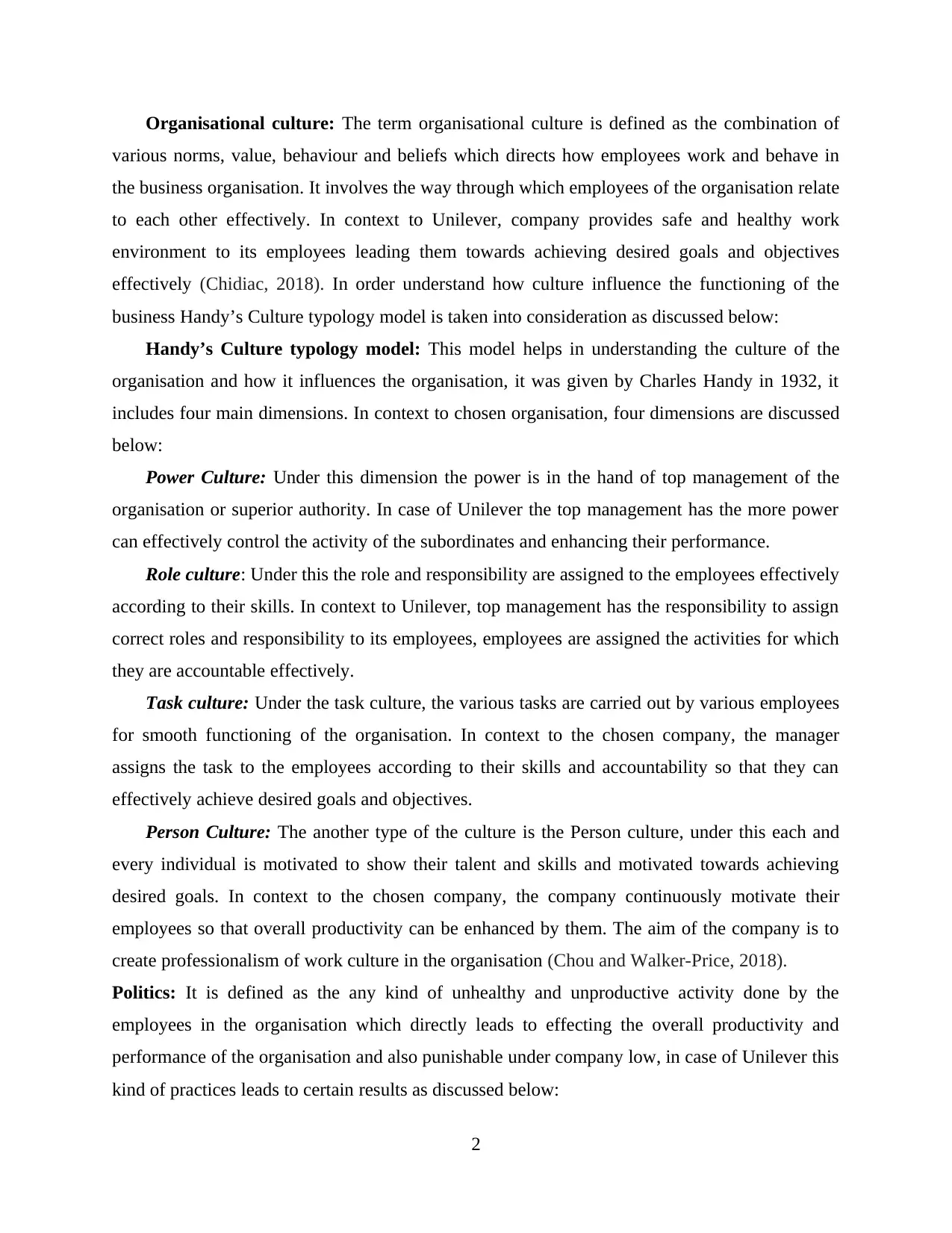
Organisational culture: The term organisational culture is defined as the combination of
various norms, value, behaviour and beliefs which directs how employees work and behave in
the business organisation. It involves the way through which employees of the organisation relate
to each other effectively. In context to Unilever, company provides safe and healthy work
environment to its employees leading them towards achieving desired goals and objectives
effectively (Chidiac, 2018). In order understand how culture influence the functioning of the
business Handy’s Culture typology model is taken into consideration as discussed below:
Handy’s Culture typology model: This model helps in understanding the culture of the
organisation and how it influences the organisation, it was given by Charles Handy in 1932, it
includes four main dimensions. In context to chosen organisation, four dimensions are discussed
below:
Power Culture: Under this dimension the power is in the hand of top management of the
organisation or superior authority. In case of Unilever the top management has the more power
can effectively control the activity of the subordinates and enhancing their performance.
Role culture: Under this the role and responsibility are assigned to the employees effectively
according to their skills. In context to Unilever, top management has the responsibility to assign
correct roles and responsibility to its employees, employees are assigned the activities for which
they are accountable effectively.
Task culture: Under the task culture, the various tasks are carried out by various employees
for smooth functioning of the organisation. In context to the chosen company, the manager
assigns the task to the employees according to their skills and accountability so that they can
effectively achieve desired goals and objectives.
Person Culture: The another type of the culture is the Person culture, under this each and
every individual is motivated to show their talent and skills and motivated towards achieving
desired goals. In context to the chosen company, the company continuously motivate their
employees so that overall productivity can be enhanced by them. The aim of the company is to
create professionalism of work culture in the organisation (Chou and Walker-Price, 2018).
Politics: It is defined as the any kind of unhealthy and unproductive activity done by the
employees in the organisation which directly leads to effecting the overall productivity and
performance of the organisation and also punishable under company low, in case of Unilever this
kind of practices leads to certain results as discussed below:
2
various norms, value, behaviour and beliefs which directs how employees work and behave in
the business organisation. It involves the way through which employees of the organisation relate
to each other effectively. In context to Unilever, company provides safe and healthy work
environment to its employees leading them towards achieving desired goals and objectives
effectively (Chidiac, 2018). In order understand how culture influence the functioning of the
business Handy’s Culture typology model is taken into consideration as discussed below:
Handy’s Culture typology model: This model helps in understanding the culture of the
organisation and how it influences the organisation, it was given by Charles Handy in 1932, it
includes four main dimensions. In context to chosen organisation, four dimensions are discussed
below:
Power Culture: Under this dimension the power is in the hand of top management of the
organisation or superior authority. In case of Unilever the top management has the more power
can effectively control the activity of the subordinates and enhancing their performance.
Role culture: Under this the role and responsibility are assigned to the employees effectively
according to their skills. In context to Unilever, top management has the responsibility to assign
correct roles and responsibility to its employees, employees are assigned the activities for which
they are accountable effectively.
Task culture: Under the task culture, the various tasks are carried out by various employees
for smooth functioning of the organisation. In context to the chosen company, the manager
assigns the task to the employees according to their skills and accountability so that they can
effectively achieve desired goals and objectives.
Person Culture: The another type of the culture is the Person culture, under this each and
every individual is motivated to show their talent and skills and motivated towards achieving
desired goals. In context to the chosen company, the company continuously motivate their
employees so that overall productivity can be enhanced by them. The aim of the company is to
create professionalism of work culture in the organisation (Chou and Walker-Price, 2018).
Politics: It is defined as the any kind of unhealthy and unproductive activity done by the
employees in the organisation which directly leads to effecting the overall productivity and
performance of the organisation and also punishable under company low, in case of Unilever this
kind of practices leads to certain results as discussed below:
2
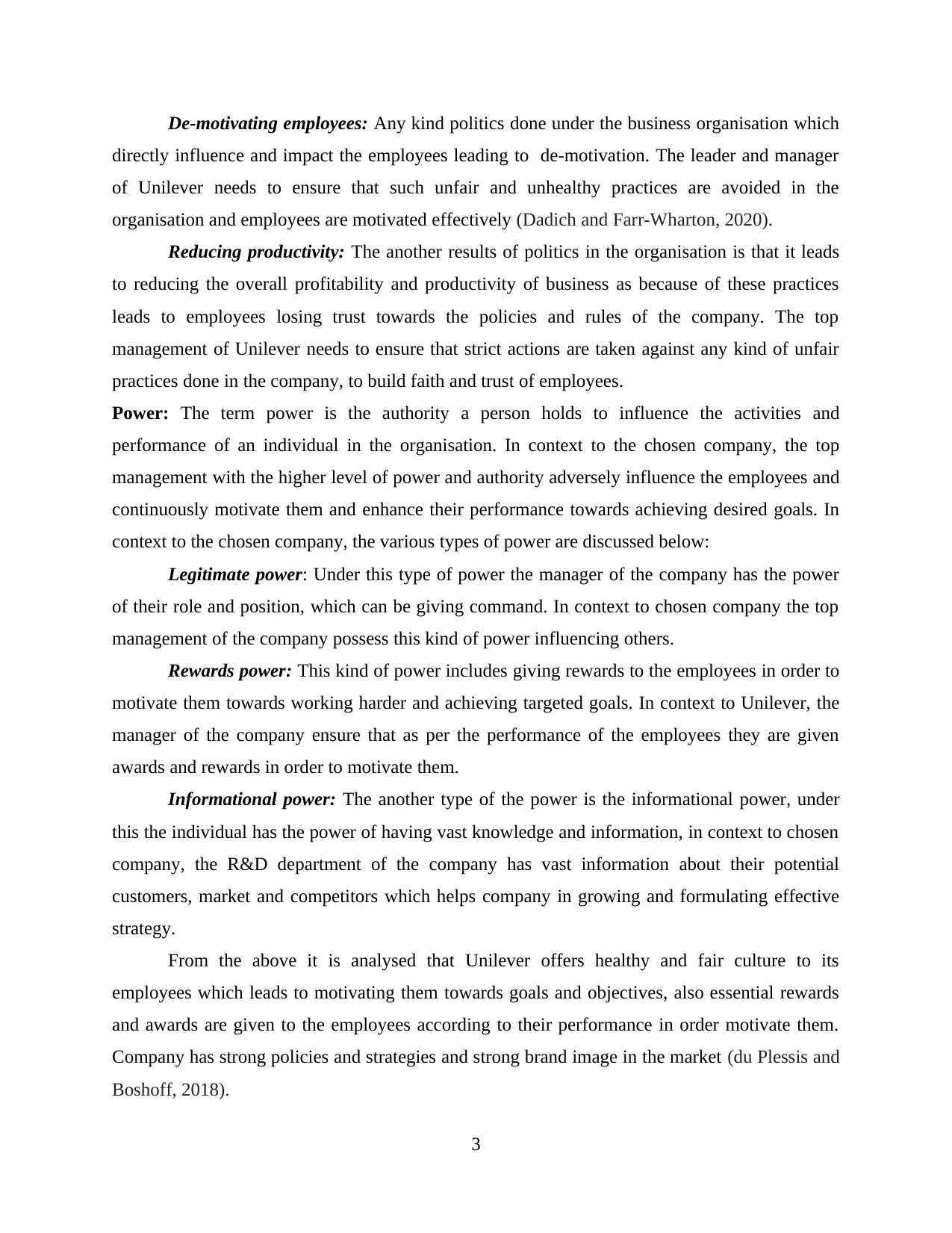
De-motivating employees: Any kind politics done under the business organisation which
directly influence and impact the employees leading to de-motivation. The leader and manager
of Unilever needs to ensure that such unfair and unhealthy practices are avoided in the
organisation and employees are motivated effectively (Dadich and Farr-Wharton, 2020).
Reducing productivity: The another results of politics in the organisation is that it leads
to reducing the overall profitability and productivity of business as because of these practices
leads to employees losing trust towards the policies and rules of the company. The top
management of Unilever needs to ensure that strict actions are taken against any kind of unfair
practices done in the company, to build faith and trust of employees.
Power: The term power is the authority a person holds to influence the activities and
performance of an individual in the organisation. In context to the chosen company, the top
management with the higher level of power and authority adversely influence the employees and
continuously motivate them and enhance their performance towards achieving desired goals. In
context to the chosen company, the various types of power are discussed below:
Legitimate power: Under this type of power the manager of the company has the power
of their role and position, which can be giving command. In context to chosen company the top
management of the company possess this kind of power influencing others.
Rewards power: This kind of power includes giving rewards to the employees in order to
motivate them towards working harder and achieving targeted goals. In context to Unilever, the
manager of the company ensure that as per the performance of the employees they are given
awards and rewards in order to motivate them.
Informational power: The another type of the power is the informational power, under
this the individual has the power of having vast knowledge and information, in context to chosen
company, the R&D department of the company has vast information about their potential
customers, market and competitors which helps company in growing and formulating effective
strategy.
From the above it is analysed that Unilever offers healthy and fair culture to its
employees which leads to motivating them towards goals and objectives, also essential rewards
and awards are given to the employees according to their performance in order motivate them.
Company has strong policies and strategies and strong brand image in the market (du Plessis and
Boshoff, 2018).
3
directly influence and impact the employees leading to de-motivation. The leader and manager
of Unilever needs to ensure that such unfair and unhealthy practices are avoided in the
organisation and employees are motivated effectively (Dadich and Farr-Wharton, 2020).
Reducing productivity: The another results of politics in the organisation is that it leads
to reducing the overall profitability and productivity of business as because of these practices
leads to employees losing trust towards the policies and rules of the company. The top
management of Unilever needs to ensure that strict actions are taken against any kind of unfair
practices done in the company, to build faith and trust of employees.
Power: The term power is the authority a person holds to influence the activities and
performance of an individual in the organisation. In context to the chosen company, the top
management with the higher level of power and authority adversely influence the employees and
continuously motivate them and enhance their performance towards achieving desired goals. In
context to the chosen company, the various types of power are discussed below:
Legitimate power: Under this type of power the manager of the company has the power
of their role and position, which can be giving command. In context to chosen company the top
management of the company possess this kind of power influencing others.
Rewards power: This kind of power includes giving rewards to the employees in order to
motivate them towards working harder and achieving targeted goals. In context to Unilever, the
manager of the company ensure that as per the performance of the employees they are given
awards and rewards in order to motivate them.
Informational power: The another type of the power is the informational power, under
this the individual has the power of having vast knowledge and information, in context to chosen
company, the R&D department of the company has vast information about their potential
customers, market and competitors which helps company in growing and formulating effective
strategy.
From the above it is analysed that Unilever offers healthy and fair culture to its
employees which leads to motivating them towards goals and objectives, also essential rewards
and awards are given to the employees according to their performance in order motivate them.
Company has strong policies and strategies and strong brand image in the market (du Plessis and
Boshoff, 2018).
3
⊘ This is a preview!⊘
Do you want full access?
Subscribe today to unlock all pages.

Trusted by 1+ million students worldwide
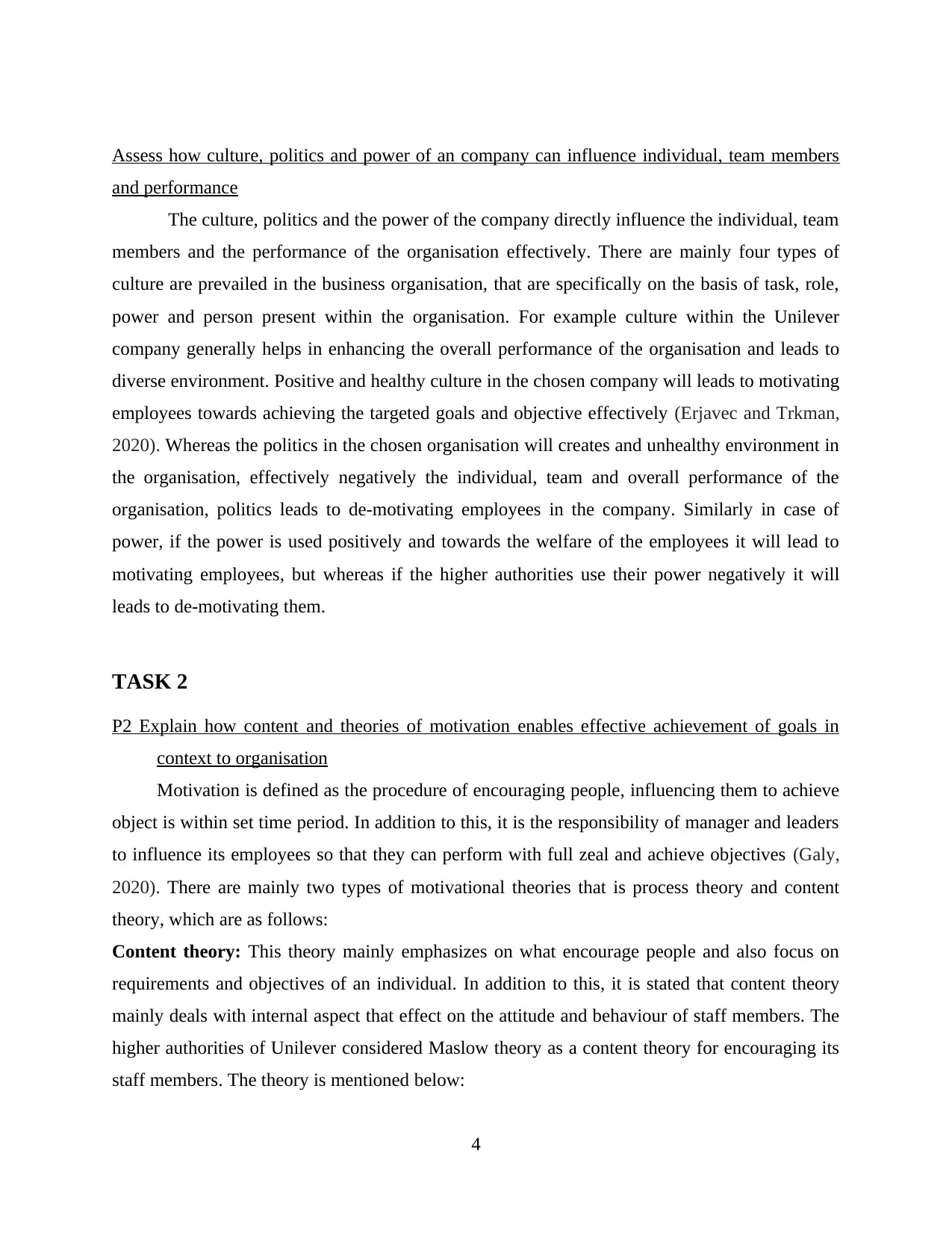
Assess how culture, politics and power of an company can influence individual, team members
and performance
The culture, politics and the power of the company directly influence the individual, team
members and the performance of the organisation effectively. There are mainly four types of
culture are prevailed in the business organisation, that are specifically on the basis of task, role,
power and person present within the organisation. For example culture within the Unilever
company generally helps in enhancing the overall performance of the organisation and leads to
diverse environment. Positive and healthy culture in the chosen company will leads to motivating
employees towards achieving the targeted goals and objective effectively (Erjavec and Trkman,
2020). Whereas the politics in the chosen organisation will creates and unhealthy environment in
the organisation, effectively negatively the individual, team and overall performance of the
organisation, politics leads to de-motivating employees in the company. Similarly in case of
power, if the power is used positively and towards the welfare of the employees it will lead to
motivating employees, but whereas if the higher authorities use their power negatively it will
leads to de-motivating them.
TASK 2
P2 Explain how content and theories of motivation enables effective achievement of goals in
context to organisation
Motivation is defined as the procedure of encouraging people, influencing them to achieve
object is within set time period. In addition to this, it is the responsibility of manager and leaders
to influence its employees so that they can perform with full zeal and achieve objectives (Galy,
2020). There are mainly two types of motivational theories that is process theory and content
theory, which are as follows:
Content theory: This theory mainly emphasizes on what encourage people and also focus on
requirements and objectives of an individual. In addition to this, it is stated that content theory
mainly deals with internal aspect that effect on the attitude and behaviour of staff members. The
higher authorities of Unilever considered Maslow theory as a content theory for encouraging its
staff members. The theory is mentioned below:
4
and performance
The culture, politics and the power of the company directly influence the individual, team
members and the performance of the organisation effectively. There are mainly four types of
culture are prevailed in the business organisation, that are specifically on the basis of task, role,
power and person present within the organisation. For example culture within the Unilever
company generally helps in enhancing the overall performance of the organisation and leads to
diverse environment. Positive and healthy culture in the chosen company will leads to motivating
employees towards achieving the targeted goals and objective effectively (Erjavec and Trkman,
2020). Whereas the politics in the chosen organisation will creates and unhealthy environment in
the organisation, effectively negatively the individual, team and overall performance of the
organisation, politics leads to de-motivating employees in the company. Similarly in case of
power, if the power is used positively and towards the welfare of the employees it will lead to
motivating employees, but whereas if the higher authorities use their power negatively it will
leads to de-motivating them.
TASK 2
P2 Explain how content and theories of motivation enables effective achievement of goals in
context to organisation
Motivation is defined as the procedure of encouraging people, influencing them to achieve
object is within set time period. In addition to this, it is the responsibility of manager and leaders
to influence its employees so that they can perform with full zeal and achieve objectives (Galy,
2020). There are mainly two types of motivational theories that is process theory and content
theory, which are as follows:
Content theory: This theory mainly emphasizes on what encourage people and also focus on
requirements and objectives of an individual. In addition to this, it is stated that content theory
mainly deals with internal aspect that effect on the attitude and behaviour of staff members. The
higher authorities of Unilever considered Maslow theory as a content theory for encouraging its
staff members. The theory is mentioned below:
4
Paraphrase This Document
Need a fresh take? Get an instant paraphrase of this document with our AI Paraphraser
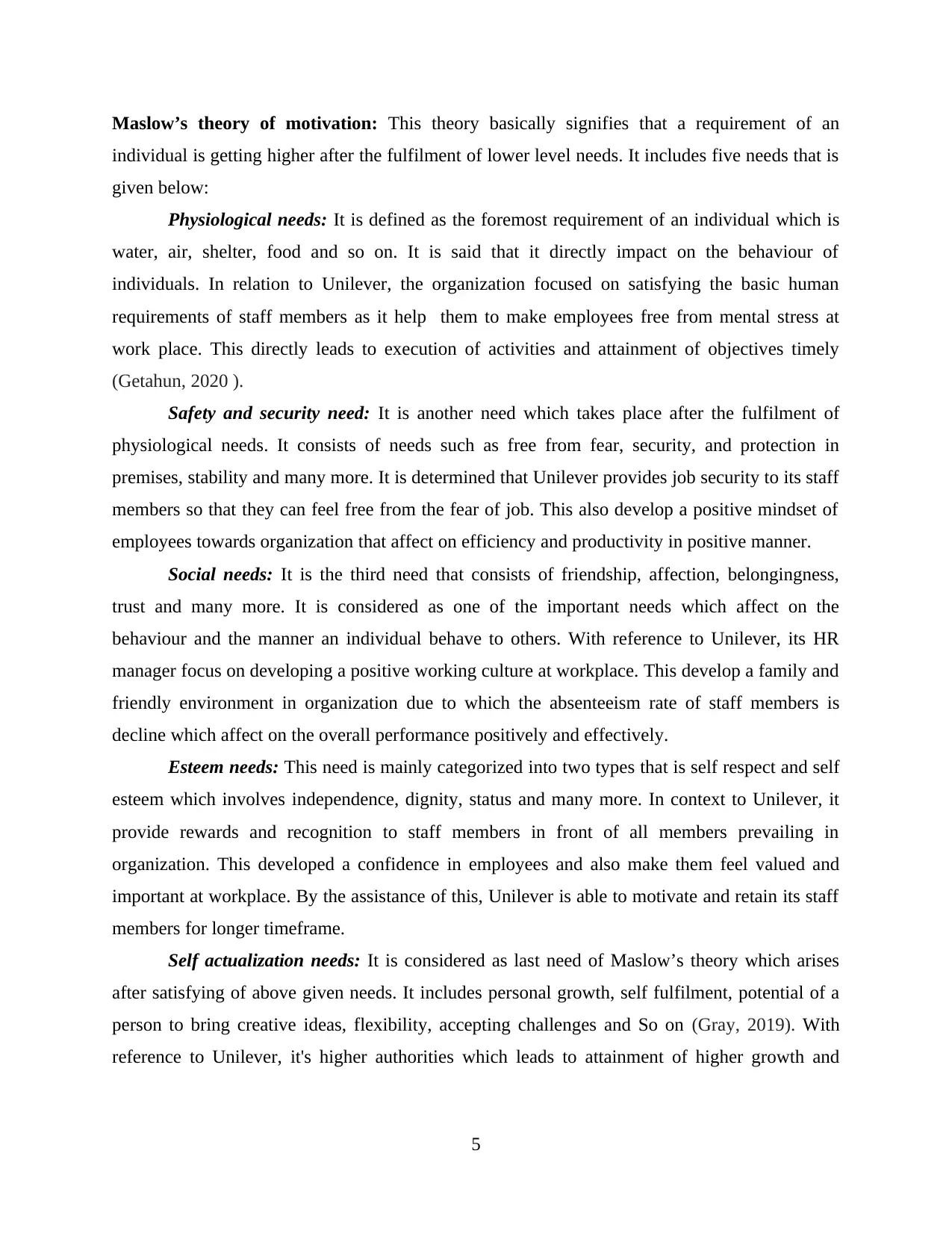
Maslow’s theory of motivation: This theory basically signifies that a requirement of an
individual is getting higher after the fulfilment of lower level needs. It includes five needs that is
given below:
Physiological needs: It is defined as the foremost requirement of an individual which is
water, air, shelter, food and so on. It is said that it directly impact on the behaviour of
individuals. In relation to Unilever, the organization focused on satisfying the basic human
requirements of staff members as it help them to make employees free from mental stress at
work place. This directly leads to execution of activities and attainment of objectives timely
(Getahun, 2020 ).
Safety and security need: It is another need which takes place after the fulfilment of
physiological needs. It consists of needs such as free from fear, security, and protection in
premises, stability and many more. It is determined that Unilever provides job security to its staff
members so that they can feel free from the fear of job. This also develop a positive mindset of
employees towards organization that affect on efficiency and productivity in positive manner.
Social needs: It is the third need that consists of friendship, affection, belongingness,
trust and many more. It is considered as one of the important needs which affect on the
behaviour and the manner an individual behave to others. With reference to Unilever, its HR
manager focus on developing a positive working culture at workplace. This develop a family and
friendly environment in organization due to which the absenteeism rate of staff members is
decline which affect on the overall performance positively and effectively.
Esteem needs: This need is mainly categorized into two types that is self respect and self
esteem which involves independence, dignity, status and many more. In context to Unilever, it
provide rewards and recognition to staff members in front of all members prevailing in
organization. This developed a confidence in employees and also make them feel valued and
important at workplace. By the assistance of this, Unilever is able to motivate and retain its staff
members for longer timeframe.
Self actualization needs: It is considered as last need of Maslow’s theory which arises
after satisfying of above given needs. It includes personal growth, self fulfilment, potential of a
person to bring creative ideas, flexibility, accepting challenges and So on (Gray, 2019). With
reference to Unilever, it's higher authorities which leads to attainment of higher growth and
5
individual is getting higher after the fulfilment of lower level needs. It includes five needs that is
given below:
Physiological needs: It is defined as the foremost requirement of an individual which is
water, air, shelter, food and so on. It is said that it directly impact on the behaviour of
individuals. In relation to Unilever, the organization focused on satisfying the basic human
requirements of staff members as it help them to make employees free from mental stress at
work place. This directly leads to execution of activities and attainment of objectives timely
(Getahun, 2020 ).
Safety and security need: It is another need which takes place after the fulfilment of
physiological needs. It consists of needs such as free from fear, security, and protection in
premises, stability and many more. It is determined that Unilever provides job security to its staff
members so that they can feel free from the fear of job. This also develop a positive mindset of
employees towards organization that affect on efficiency and productivity in positive manner.
Social needs: It is the third need that consists of friendship, affection, belongingness,
trust and many more. It is considered as one of the important needs which affect on the
behaviour and the manner an individual behave to others. With reference to Unilever, its HR
manager focus on developing a positive working culture at workplace. This develop a family and
friendly environment in organization due to which the absenteeism rate of staff members is
decline which affect on the overall performance positively and effectively.
Esteem needs: This need is mainly categorized into two types that is self respect and self
esteem which involves independence, dignity, status and many more. In context to Unilever, it
provide rewards and recognition to staff members in front of all members prevailing in
organization. This developed a confidence in employees and also make them feel valued and
important at workplace. By the assistance of this, Unilever is able to motivate and retain its staff
members for longer timeframe.
Self actualization needs: It is considered as last need of Maslow’s theory which arises
after satisfying of above given needs. It includes personal growth, self fulfilment, potential of a
person to bring creative ideas, flexibility, accepting challenges and So on (Gray, 2019). With
reference to Unilever, it's higher authorities which leads to attainment of higher growth and
5
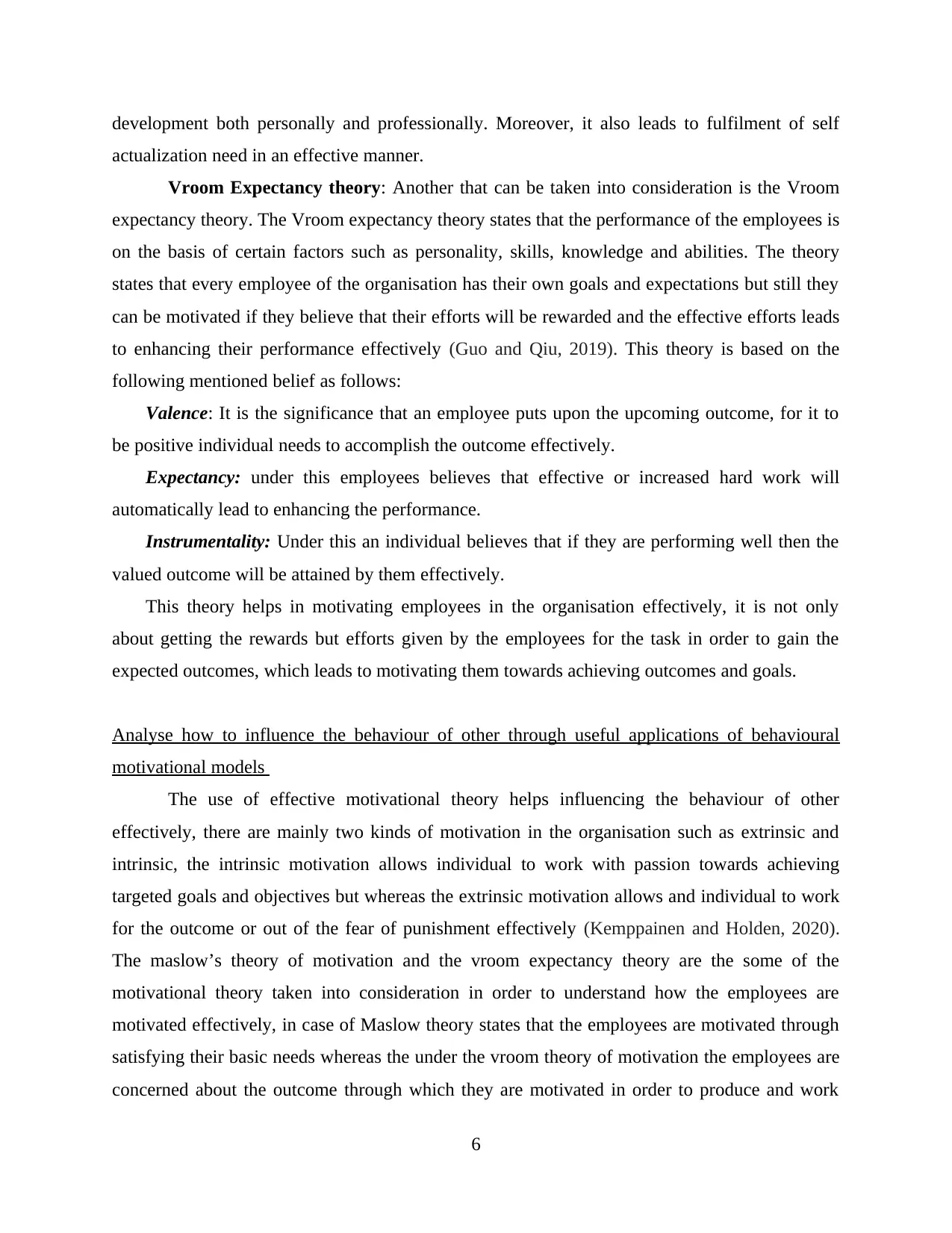
development both personally and professionally. Moreover, it also leads to fulfilment of self
actualization need in an effective manner.
Vroom Expectancy theory: Another that can be taken into consideration is the Vroom
expectancy theory. The Vroom expectancy theory states that the performance of the employees is
on the basis of certain factors such as personality, skills, knowledge and abilities. The theory
states that every employee of the organisation has their own goals and expectations but still they
can be motivated if they believe that their efforts will be rewarded and the effective efforts leads
to enhancing their performance effectively (Guo and Qiu, 2019). This theory is based on the
following mentioned belief as follows:
Valence: It is the significance that an employee puts upon the upcoming outcome, for it to
be positive individual needs to accomplish the outcome effectively.
Expectancy: under this employees believes that effective or increased hard work will
automatically lead to enhancing the performance.
Instrumentality: Under this an individual believes that if they are performing well then the
valued outcome will be attained by them effectively.
This theory helps in motivating employees in the organisation effectively, it is not only
about getting the rewards but efforts given by the employees for the task in order to gain the
expected outcomes, which leads to motivating them towards achieving outcomes and goals.
Analyse how to influence the behaviour of other through useful applications of behavioural
motivational models
The use of effective motivational theory helps influencing the behaviour of other
effectively, there are mainly two kinds of motivation in the organisation such as extrinsic and
intrinsic, the intrinsic motivation allows individual to work with passion towards achieving
targeted goals and objectives but whereas the extrinsic motivation allows and individual to work
for the outcome or out of the fear of punishment effectively (Kemppainen and Holden, 2020).
The maslow’s theory of motivation and the vroom expectancy theory are the some of the
motivational theory taken into consideration in order to understand how the employees are
motivated effectively, in case of Maslow theory states that the employees are motivated through
satisfying their basic needs whereas the under the vroom theory of motivation the employees are
concerned about the outcome through which they are motivated in order to produce and work
6
actualization need in an effective manner.
Vroom Expectancy theory: Another that can be taken into consideration is the Vroom
expectancy theory. The Vroom expectancy theory states that the performance of the employees is
on the basis of certain factors such as personality, skills, knowledge and abilities. The theory
states that every employee of the organisation has their own goals and expectations but still they
can be motivated if they believe that their efforts will be rewarded and the effective efforts leads
to enhancing their performance effectively (Guo and Qiu, 2019). This theory is based on the
following mentioned belief as follows:
Valence: It is the significance that an employee puts upon the upcoming outcome, for it to
be positive individual needs to accomplish the outcome effectively.
Expectancy: under this employees believes that effective or increased hard work will
automatically lead to enhancing the performance.
Instrumentality: Under this an individual believes that if they are performing well then the
valued outcome will be attained by them effectively.
This theory helps in motivating employees in the organisation effectively, it is not only
about getting the rewards but efforts given by the employees for the task in order to gain the
expected outcomes, which leads to motivating them towards achieving outcomes and goals.
Analyse how to influence the behaviour of other through useful applications of behavioural
motivational models
The use of effective motivational theory helps influencing the behaviour of other
effectively, there are mainly two kinds of motivation in the organisation such as extrinsic and
intrinsic, the intrinsic motivation allows individual to work with passion towards achieving
targeted goals and objectives but whereas the extrinsic motivation allows and individual to work
for the outcome or out of the fear of punishment effectively (Kemppainen and Holden, 2020).
The maslow’s theory of motivation and the vroom expectancy theory are the some of the
motivational theory taken into consideration in order to understand how the employees are
motivated effectively, in case of Maslow theory states that the employees are motivated through
satisfying their basic needs whereas the under the vroom theory of motivation the employees are
concerned about the outcome through which they are motivated in order to produce and work
6
⊘ This is a preview!⊘
Do you want full access?
Subscribe today to unlock all pages.

Trusted by 1+ million students worldwide
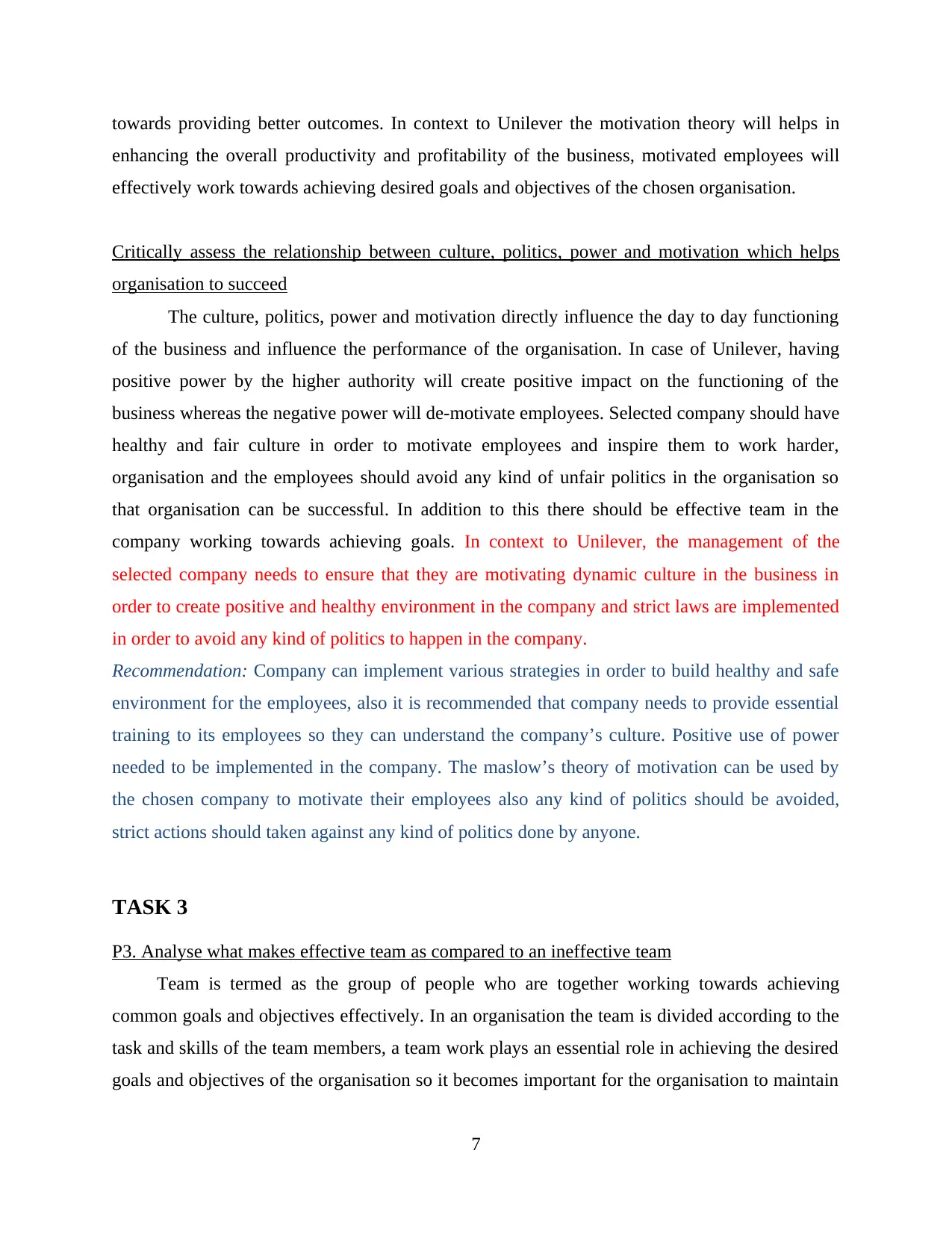
towards providing better outcomes. In context to Unilever the motivation theory will helps in
enhancing the overall productivity and profitability of the business, motivated employees will
effectively work towards achieving desired goals and objectives of the chosen organisation.
Critically assess the relationship between culture, politics, power and motivation which helps
organisation to succeed
The culture, politics, power and motivation directly influence the day to day functioning
of the business and influence the performance of the organisation. In case of Unilever, having
positive power by the higher authority will create positive impact on the functioning of the
business whereas the negative power will de-motivate employees. Selected company should have
healthy and fair culture in order to motivate employees and inspire them to work harder,
organisation and the employees should avoid any kind of unfair politics in the organisation so
that organisation can be successful. In addition to this there should be effective team in the
company working towards achieving goals. In context to Unilever, the management of the
selected company needs to ensure that they are motivating dynamic culture in the business in
order to create positive and healthy environment in the company and strict laws are implemented
in order to avoid any kind of politics to happen in the company.
Recommendation: Company can implement various strategies in order to build healthy and safe
environment for the employees, also it is recommended that company needs to provide essential
training to its employees so they can understand the company’s culture. Positive use of power
needed to be implemented in the company. The maslow’s theory of motivation can be used by
the chosen company to motivate their employees also any kind of politics should be avoided,
strict actions should taken against any kind of politics done by anyone.
TASK 3
P3. Analyse what makes effective team as compared to an ineffective team
Team is termed as the group of people who are together working towards achieving
common goals and objectives effectively. In an organisation the team is divided according to the
task and skills of the team members, a team work plays an essential role in achieving the desired
goals and objectives of the organisation so it becomes important for the organisation to maintain
7
enhancing the overall productivity and profitability of the business, motivated employees will
effectively work towards achieving desired goals and objectives of the chosen organisation.
Critically assess the relationship between culture, politics, power and motivation which helps
organisation to succeed
The culture, politics, power and motivation directly influence the day to day functioning
of the business and influence the performance of the organisation. In case of Unilever, having
positive power by the higher authority will create positive impact on the functioning of the
business whereas the negative power will de-motivate employees. Selected company should have
healthy and fair culture in order to motivate employees and inspire them to work harder,
organisation and the employees should avoid any kind of unfair politics in the organisation so
that organisation can be successful. In addition to this there should be effective team in the
company working towards achieving goals. In context to Unilever, the management of the
selected company needs to ensure that they are motivating dynamic culture in the business in
order to create positive and healthy environment in the company and strict laws are implemented
in order to avoid any kind of politics to happen in the company.
Recommendation: Company can implement various strategies in order to build healthy and safe
environment for the employees, also it is recommended that company needs to provide essential
training to its employees so they can understand the company’s culture. Positive use of power
needed to be implemented in the company. The maslow’s theory of motivation can be used by
the chosen company to motivate their employees also any kind of politics should be avoided,
strict actions should taken against any kind of politics done by anyone.
TASK 3
P3. Analyse what makes effective team as compared to an ineffective team
Team is termed as the group of people who are together working towards achieving
common goals and objectives effectively. In an organisation the team is divided according to the
task and skills of the team members, a team work plays an essential role in achieving the desired
goals and objectives of the organisation so it becomes important for the organisation to maintain
7
Paraphrase This Document
Need a fresh take? Get an instant paraphrase of this document with our AI Paraphraser
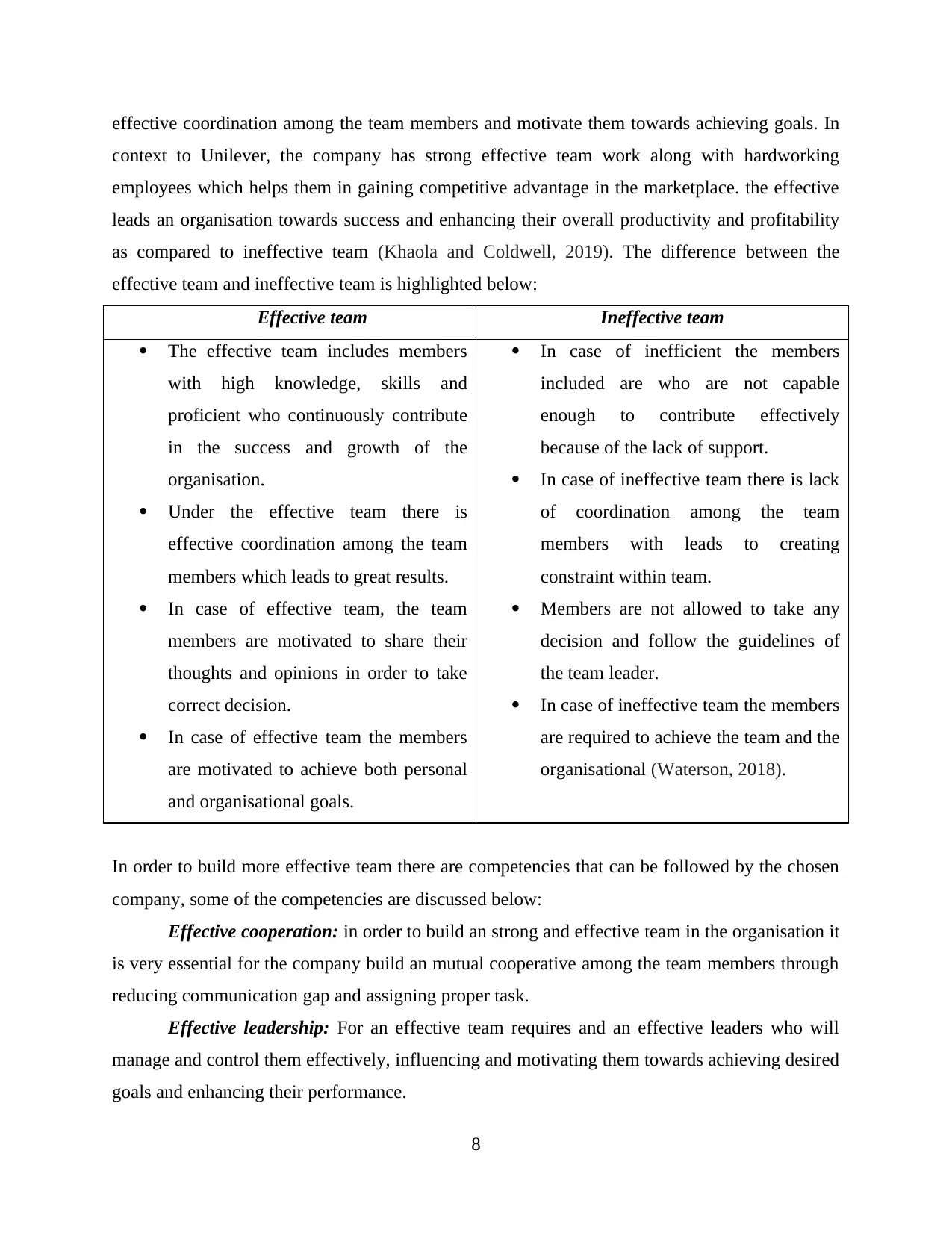
effective coordination among the team members and motivate them towards achieving goals. In
context to Unilever, the company has strong effective team work along with hardworking
employees which helps them in gaining competitive advantage in the marketplace. the effective
leads an organisation towards success and enhancing their overall productivity and profitability
as compared to ineffective team (Khaola and Coldwell, 2019). The difference between the
effective team and ineffective team is highlighted below:
Effective team Ineffective team
The effective team includes members
with high knowledge, skills and
proficient who continuously contribute
in the success and growth of the
organisation.
Under the effective team there is
effective coordination among the team
members which leads to great results.
In case of effective team, the team
members are motivated to share their
thoughts and opinions in order to take
correct decision.
In case of effective team the members
are motivated to achieve both personal
and organisational goals.
In case of inefficient the members
included are who are not capable
enough to contribute effectively
because of the lack of support.
In case of ineffective team there is lack
of coordination among the team
members with leads to creating
constraint within team.
Members are not allowed to take any
decision and follow the guidelines of
the team leader.
In case of ineffective team the members
are required to achieve the team and the
organisational (Waterson, 2018).
In order to build more effective team there are competencies that can be followed by the chosen
company, some of the competencies are discussed below:
Effective cooperation: in order to build an strong and effective team in the organisation it
is very essential for the company build an mutual cooperative among the team members through
reducing communication gap and assigning proper task.
Effective leadership: For an effective team requires and an effective leaders who will
manage and control them effectively, influencing and motivating them towards achieving desired
goals and enhancing their performance.
8
context to Unilever, the company has strong effective team work along with hardworking
employees which helps them in gaining competitive advantage in the marketplace. the effective
leads an organisation towards success and enhancing their overall productivity and profitability
as compared to ineffective team (Khaola and Coldwell, 2019). The difference between the
effective team and ineffective team is highlighted below:
Effective team Ineffective team
The effective team includes members
with high knowledge, skills and
proficient who continuously contribute
in the success and growth of the
organisation.
Under the effective team there is
effective coordination among the team
members which leads to great results.
In case of effective team, the team
members are motivated to share their
thoughts and opinions in order to take
correct decision.
In case of effective team the members
are motivated to achieve both personal
and organisational goals.
In case of inefficient the members
included are who are not capable
enough to contribute effectively
because of the lack of support.
In case of ineffective team there is lack
of coordination among the team
members with leads to creating
constraint within team.
Members are not allowed to take any
decision and follow the guidelines of
the team leader.
In case of ineffective team the members
are required to achieve the team and the
organisational (Waterson, 2018).
In order to build more effective team there are competencies that can be followed by the chosen
company, some of the competencies are discussed below:
Effective cooperation: in order to build an strong and effective team in the organisation it
is very essential for the company build an mutual cooperative among the team members through
reducing communication gap and assigning proper task.
Effective leadership: For an effective team requires and an effective leaders who will
manage and control them effectively, influencing and motivating them towards achieving desired
goals and enhancing their performance.
8
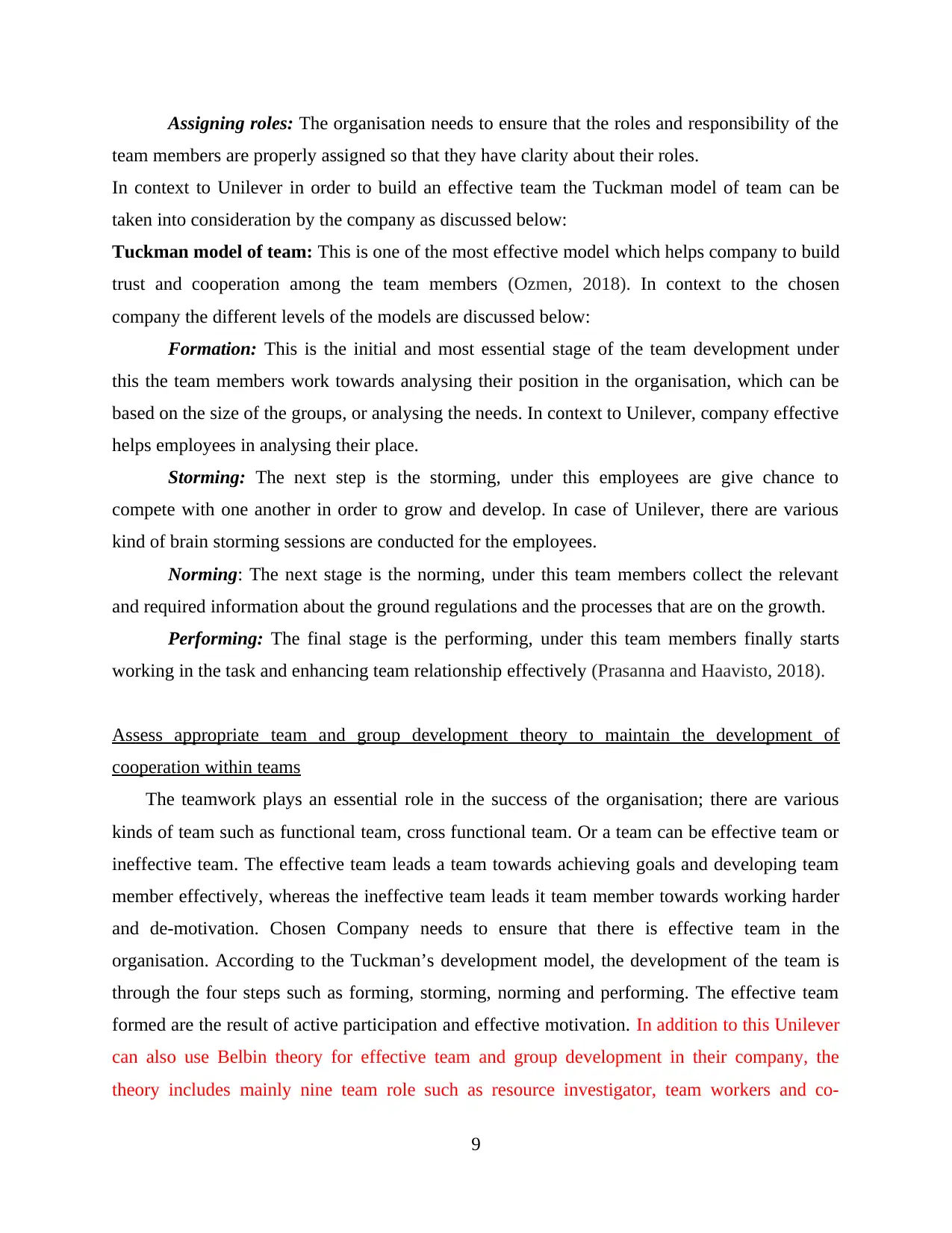
Assigning roles: The organisation needs to ensure that the roles and responsibility of the
team members are properly assigned so that they have clarity about their roles.
In context to Unilever in order to build an effective team the Tuckman model of team can be
taken into consideration by the company as discussed below:
Tuckman model of team: This is one of the most effective model which helps company to build
trust and cooperation among the team members (Ozmen, 2018). In context to the chosen
company the different levels of the models are discussed below:
Formation: This is the initial and most essential stage of the team development under
this the team members work towards analysing their position in the organisation, which can be
based on the size of the groups, or analysing the needs. In context to Unilever, company effective
helps employees in analysing their place.
Storming: The next step is the storming, under this employees are give chance to
compete with one another in order to grow and develop. In case of Unilever, there are various
kind of brain storming sessions are conducted for the employees.
Norming: The next stage is the norming, under this team members collect the relevant
and required information about the ground regulations and the processes that are on the growth.
Performing: The final stage is the performing, under this team members finally starts
working in the task and enhancing team relationship effectively (Prasanna and Haavisto, 2018).
Assess appropriate team and group development theory to maintain the development of
cooperation within teams
The teamwork plays an essential role in the success of the organisation; there are various
kinds of team such as functional team, cross functional team. Or a team can be effective team or
ineffective team. The effective team leads a team towards achieving goals and developing team
member effectively, whereas the ineffective team leads it team member towards working harder
and de-motivation. Chosen Company needs to ensure that there is effective team in the
organisation. According to the Tuckman’s development model, the development of the team is
through the four steps such as forming, storming, norming and performing. The effective team
formed are the result of active participation and effective motivation. In addition to this Unilever
can also use Belbin theory for effective team and group development in their company, the
theory includes mainly nine team role such as resource investigator, team workers and co-
9
team members are properly assigned so that they have clarity about their roles.
In context to Unilever in order to build an effective team the Tuckman model of team can be
taken into consideration by the company as discussed below:
Tuckman model of team: This is one of the most effective model which helps company to build
trust and cooperation among the team members (Ozmen, 2018). In context to the chosen
company the different levels of the models are discussed below:
Formation: This is the initial and most essential stage of the team development under
this the team members work towards analysing their position in the organisation, which can be
based on the size of the groups, or analysing the needs. In context to Unilever, company effective
helps employees in analysing their place.
Storming: The next step is the storming, under this employees are give chance to
compete with one another in order to grow and develop. In case of Unilever, there are various
kind of brain storming sessions are conducted for the employees.
Norming: The next stage is the norming, under this team members collect the relevant
and required information about the ground regulations and the processes that are on the growth.
Performing: The final stage is the performing, under this team members finally starts
working in the task and enhancing team relationship effectively (Prasanna and Haavisto, 2018).
Assess appropriate team and group development theory to maintain the development of
cooperation within teams
The teamwork plays an essential role in the success of the organisation; there are various
kinds of team such as functional team, cross functional team. Or a team can be effective team or
ineffective team. The effective team leads a team towards achieving goals and developing team
member effectively, whereas the ineffective team leads it team member towards working harder
and de-motivation. Chosen Company needs to ensure that there is effective team in the
organisation. According to the Tuckman’s development model, the development of the team is
through the four steps such as forming, storming, norming and performing. The effective team
formed are the result of active participation and effective motivation. In addition to this Unilever
can also use Belbin theory for effective team and group development in their company, the
theory includes mainly nine team role such as resource investigator, team workers and co-
9
⊘ This is a preview!⊘
Do you want full access?
Subscribe today to unlock all pages.

Trusted by 1+ million students worldwide
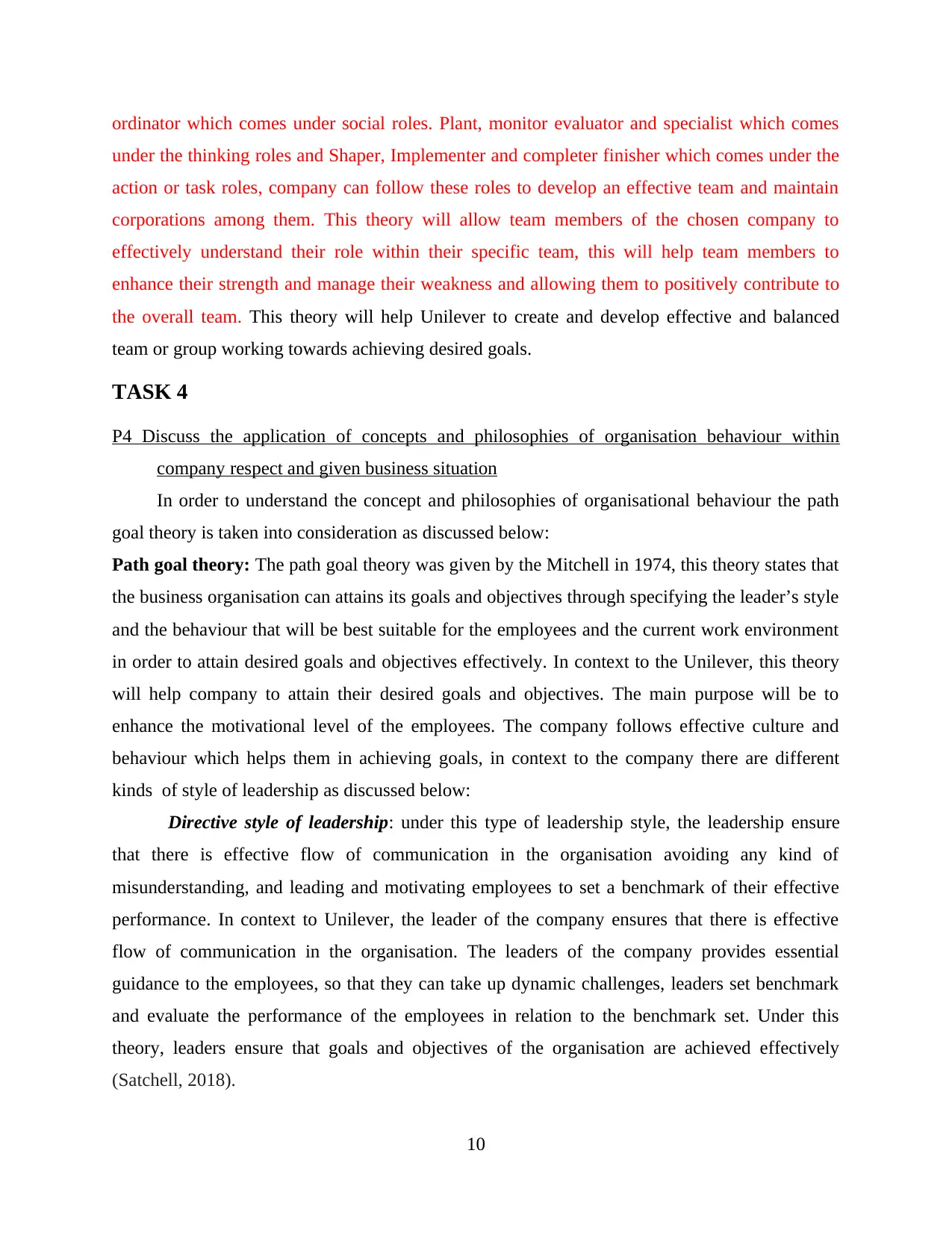
ordinator which comes under social roles. Plant, monitor evaluator and specialist which comes
under the thinking roles and Shaper, Implementer and completer finisher which comes under the
action or task roles, company can follow these roles to develop an effective team and maintain
corporations among them. This theory will allow team members of the chosen company to
effectively understand their role within their specific team, this will help team members to
enhance their strength and manage their weakness and allowing them to positively contribute to
the overall team. This theory will help Unilever to create and develop effective and balanced
team or group working towards achieving desired goals.
TASK 4
P4 Discuss the application of concepts and philosophies of organisation behaviour within
company respect and given business situation
In order to understand the concept and philosophies of organisational behaviour the path
goal theory is taken into consideration as discussed below:
Path goal theory: The path goal theory was given by the Mitchell in 1974, this theory states that
the business organisation can attains its goals and objectives through specifying the leader’s style
and the behaviour that will be best suitable for the employees and the current work environment
in order to attain desired goals and objectives effectively. In context to the Unilever, this theory
will help company to attain their desired goals and objectives. The main purpose will be to
enhance the motivational level of the employees. The company follows effective culture and
behaviour which helps them in achieving goals, in context to the company there are different
kinds of style of leadership as discussed below:
Directive style of leadership: under this type of leadership style, the leadership ensure
that there is effective flow of communication in the organisation avoiding any kind of
misunderstanding, and leading and motivating employees to set a benchmark of their effective
performance. In context to Unilever, the leader of the company ensures that there is effective
flow of communication in the organisation. The leaders of the company provides essential
guidance to the employees, so that they can take up dynamic challenges, leaders set benchmark
and evaluate the performance of the employees in relation to the benchmark set. Under this
theory, leaders ensure that goals and objectives of the organisation are achieved effectively
(Satchell, 2018).
10
under the thinking roles and Shaper, Implementer and completer finisher which comes under the
action or task roles, company can follow these roles to develop an effective team and maintain
corporations among them. This theory will allow team members of the chosen company to
effectively understand their role within their specific team, this will help team members to
enhance their strength and manage their weakness and allowing them to positively contribute to
the overall team. This theory will help Unilever to create and develop effective and balanced
team or group working towards achieving desired goals.
TASK 4
P4 Discuss the application of concepts and philosophies of organisation behaviour within
company respect and given business situation
In order to understand the concept and philosophies of organisational behaviour the path
goal theory is taken into consideration as discussed below:
Path goal theory: The path goal theory was given by the Mitchell in 1974, this theory states that
the business organisation can attains its goals and objectives through specifying the leader’s style
and the behaviour that will be best suitable for the employees and the current work environment
in order to attain desired goals and objectives effectively. In context to the Unilever, this theory
will help company to attain their desired goals and objectives. The main purpose will be to
enhance the motivational level of the employees. The company follows effective culture and
behaviour which helps them in achieving goals, in context to the company there are different
kinds of style of leadership as discussed below:
Directive style of leadership: under this type of leadership style, the leadership ensure
that there is effective flow of communication in the organisation avoiding any kind of
misunderstanding, and leading and motivating employees to set a benchmark of their effective
performance. In context to Unilever, the leader of the company ensures that there is effective
flow of communication in the organisation. The leaders of the company provides essential
guidance to the employees, so that they can take up dynamic challenges, leaders set benchmark
and evaluate the performance of the employees in relation to the benchmark set. Under this
theory, leaders ensure that goals and objectives of the organisation are achieved effectively
(Satchell, 2018).
10
Paraphrase This Document
Need a fresh take? Get an instant paraphrase of this document with our AI Paraphraser
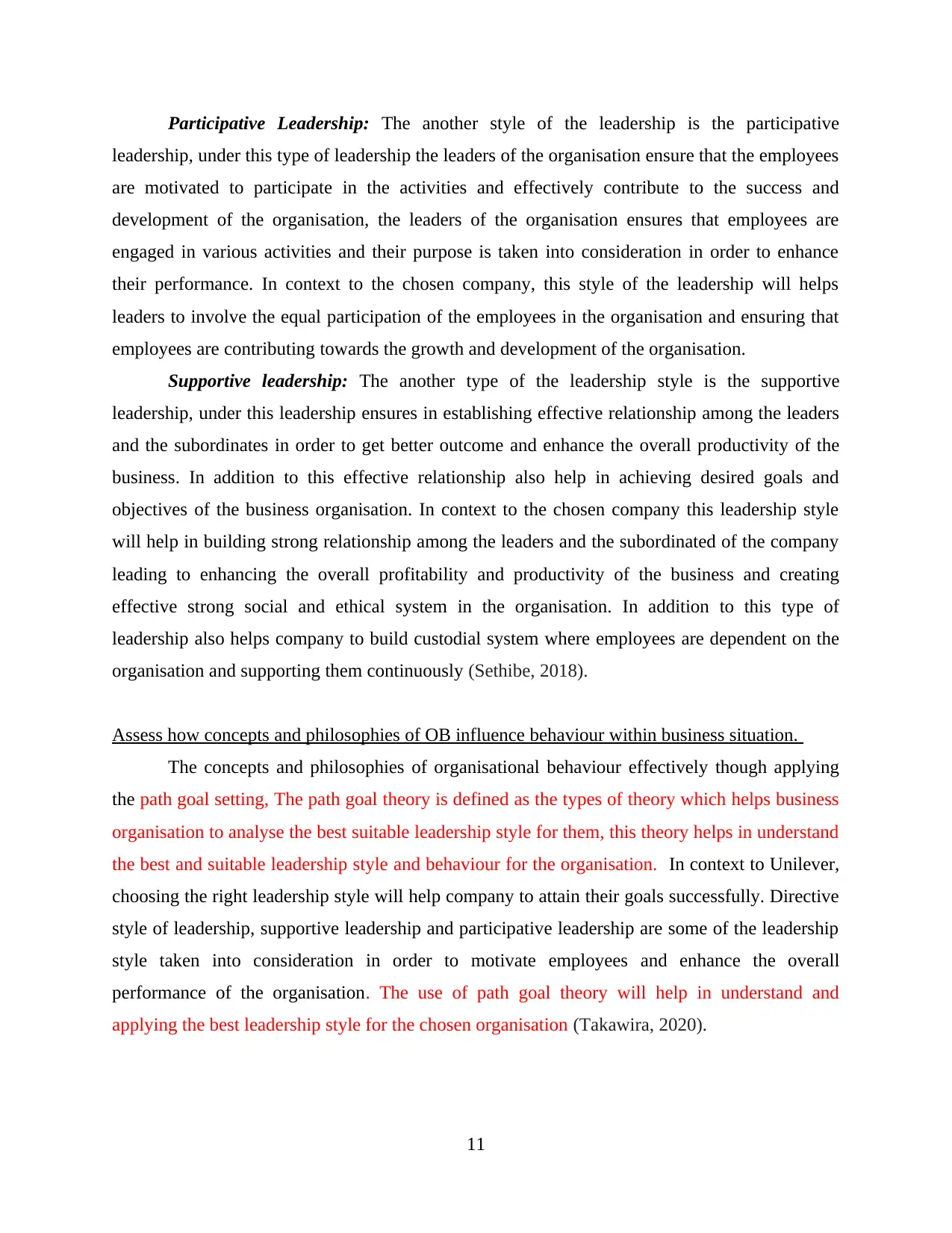
Participative Leadership: The another style of the leadership is the participative
leadership, under this type of leadership the leaders of the organisation ensure that the employees
are motivated to participate in the activities and effectively contribute to the success and
development of the organisation, the leaders of the organisation ensures that employees are
engaged in various activities and their purpose is taken into consideration in order to enhance
their performance. In context to the chosen company, this style of the leadership will helps
leaders to involve the equal participation of the employees in the organisation and ensuring that
employees are contributing towards the growth and development of the organisation.
Supportive leadership: The another type of the leadership style is the supportive
leadership, under this leadership ensures in establishing effective relationship among the leaders
and the subordinates in order to get better outcome and enhance the overall productivity of the
business. In addition to this effective relationship also help in achieving desired goals and
objectives of the business organisation. In context to the chosen company this leadership style
will help in building strong relationship among the leaders and the subordinated of the company
leading to enhancing the overall profitability and productivity of the business and creating
effective strong social and ethical system in the organisation. In addition to this type of
leadership also helps company to build custodial system where employees are dependent on the
organisation and supporting them continuously (Sethibe, 2018).
Assess how concepts and philosophies of OB influence behaviour within business situation.
The concepts and philosophies of organisational behaviour effectively though applying
the path goal setting, The path goal theory is defined as the types of theory which helps business
organisation to analyse the best suitable leadership style for them, this theory helps in understand
the best and suitable leadership style and behaviour for the organisation. In context to Unilever,
choosing the right leadership style will help company to attain their goals successfully. Directive
style of leadership, supportive leadership and participative leadership are some of the leadership
style taken into consideration in order to motivate employees and enhance the overall
performance of the organisation. The use of path goal theory will help in understand and
applying the best leadership style for the chosen organisation (Takawira, 2020).
11
leadership, under this type of leadership the leaders of the organisation ensure that the employees
are motivated to participate in the activities and effectively contribute to the success and
development of the organisation, the leaders of the organisation ensures that employees are
engaged in various activities and their purpose is taken into consideration in order to enhance
their performance. In context to the chosen company, this style of the leadership will helps
leaders to involve the equal participation of the employees in the organisation and ensuring that
employees are contributing towards the growth and development of the organisation.
Supportive leadership: The another type of the leadership style is the supportive
leadership, under this leadership ensures in establishing effective relationship among the leaders
and the subordinates in order to get better outcome and enhance the overall productivity of the
business. In addition to this effective relationship also help in achieving desired goals and
objectives of the business organisation. In context to the chosen company this leadership style
will help in building strong relationship among the leaders and the subordinated of the company
leading to enhancing the overall profitability and productivity of the business and creating
effective strong social and ethical system in the organisation. In addition to this type of
leadership also helps company to build custodial system where employees are dependent on the
organisation and supporting them continuously (Sethibe, 2018).
Assess how concepts and philosophies of OB influence behaviour within business situation.
The concepts and philosophies of organisational behaviour effectively though applying
the path goal setting, The path goal theory is defined as the types of theory which helps business
organisation to analyse the best suitable leadership style for them, this theory helps in understand
the best and suitable leadership style and behaviour for the organisation. In context to Unilever,
choosing the right leadership style will help company to attain their goals successfully. Directive
style of leadership, supportive leadership and participative leadership are some of the leadership
style taken into consideration in order to motivate employees and enhance the overall
performance of the organisation. The use of path goal theory will help in understand and
applying the best leadership style for the chosen organisation (Takawira, 2020).
11
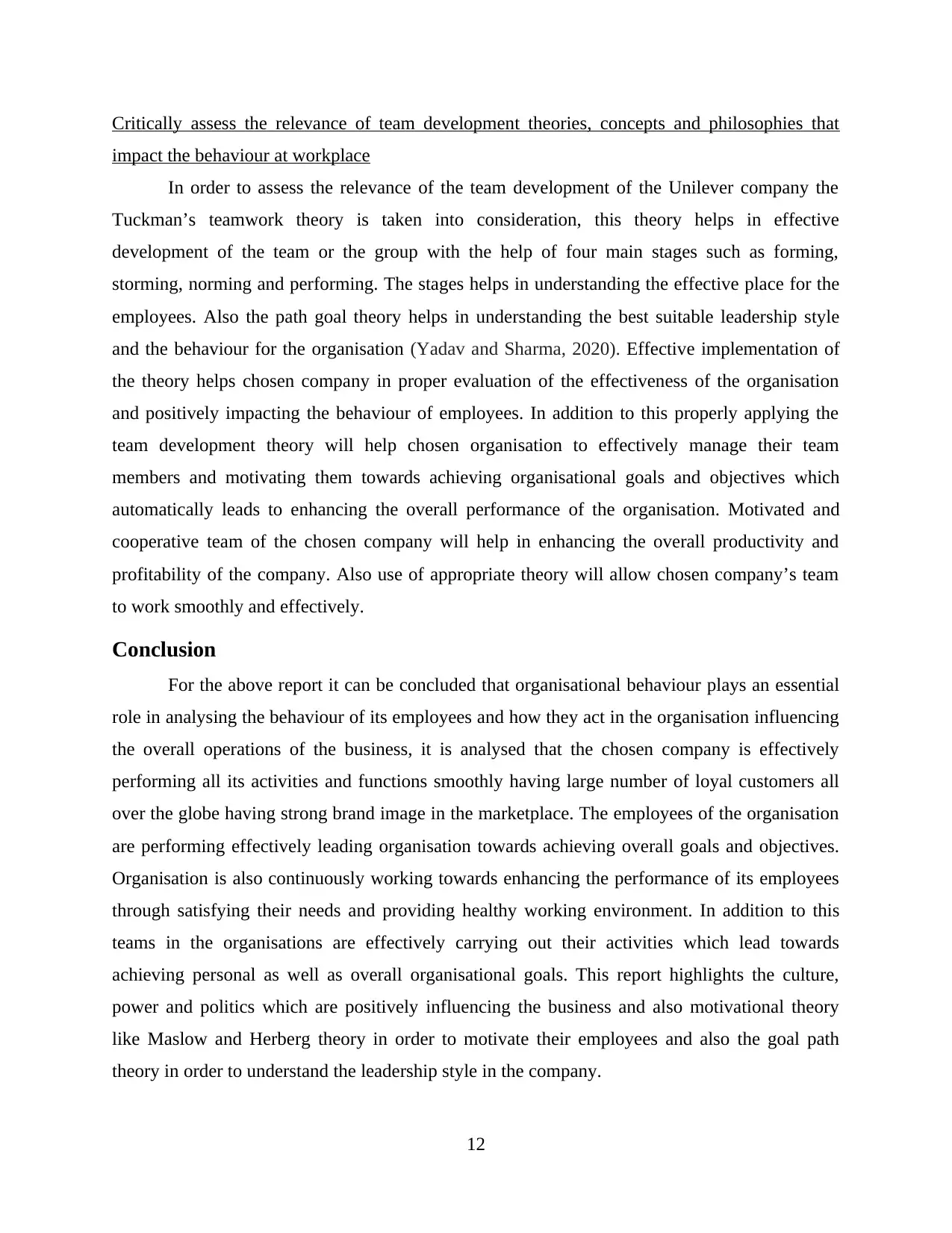
Critically assess the relevance of team development theories, concepts and philosophies that
impact the behaviour at workplace
In order to assess the relevance of the team development of the Unilever company the
Tuckman’s teamwork theory is taken into consideration, this theory helps in effective
development of the team or the group with the help of four main stages such as forming,
storming, norming and performing. The stages helps in understanding the effective place for the
employees. Also the path goal theory helps in understanding the best suitable leadership style
and the behaviour for the organisation (Yadav and Sharma, 2020). Effective implementation of
the theory helps chosen company in proper evaluation of the effectiveness of the organisation
and positively impacting the behaviour of employees. In addition to this properly applying the
team development theory will help chosen organisation to effectively manage their team
members and motivating them towards achieving organisational goals and objectives which
automatically leads to enhancing the overall performance of the organisation. Motivated and
cooperative team of the chosen company will help in enhancing the overall productivity and
profitability of the company. Also use of appropriate theory will allow chosen company’s team
to work smoothly and effectively.
Conclusion
For the above report it can be concluded that organisational behaviour plays an essential
role in analysing the behaviour of its employees and how they act in the organisation influencing
the overall operations of the business, it is analysed that the chosen company is effectively
performing all its activities and functions smoothly having large number of loyal customers all
over the globe having strong brand image in the marketplace. The employees of the organisation
are performing effectively leading organisation towards achieving overall goals and objectives.
Organisation is also continuously working towards enhancing the performance of its employees
through satisfying their needs and providing healthy working environment. In addition to this
teams in the organisations are effectively carrying out their activities which lead towards
achieving personal as well as overall organisational goals. This report highlights the culture,
power and politics which are positively influencing the business and also motivational theory
like Maslow and Herberg theory in order to motivate their employees and also the goal path
theory in order to understand the leadership style in the company.
12
impact the behaviour at workplace
In order to assess the relevance of the team development of the Unilever company the
Tuckman’s teamwork theory is taken into consideration, this theory helps in effective
development of the team or the group with the help of four main stages such as forming,
storming, norming and performing. The stages helps in understanding the effective place for the
employees. Also the path goal theory helps in understanding the best suitable leadership style
and the behaviour for the organisation (Yadav and Sharma, 2020). Effective implementation of
the theory helps chosen company in proper evaluation of the effectiveness of the organisation
and positively impacting the behaviour of employees. In addition to this properly applying the
team development theory will help chosen organisation to effectively manage their team
members and motivating them towards achieving organisational goals and objectives which
automatically leads to enhancing the overall performance of the organisation. Motivated and
cooperative team of the chosen company will help in enhancing the overall productivity and
profitability of the company. Also use of appropriate theory will allow chosen company’s team
to work smoothly and effectively.
Conclusion
For the above report it can be concluded that organisational behaviour plays an essential
role in analysing the behaviour of its employees and how they act in the organisation influencing
the overall operations of the business, it is analysed that the chosen company is effectively
performing all its activities and functions smoothly having large number of loyal customers all
over the globe having strong brand image in the marketplace. The employees of the organisation
are performing effectively leading organisation towards achieving overall goals and objectives.
Organisation is also continuously working towards enhancing the performance of its employees
through satisfying their needs and providing healthy working environment. In addition to this
teams in the organisations are effectively carrying out their activities which lead towards
achieving personal as well as overall organisational goals. This report highlights the culture,
power and politics which are positively influencing the business and also motivational theory
like Maslow and Herberg theory in order to motivate their employees and also the goal path
theory in order to understand the leadership style in the company.
12
⊘ This is a preview!⊘
Do you want full access?
Subscribe today to unlock all pages.

Trusted by 1+ million students worldwide
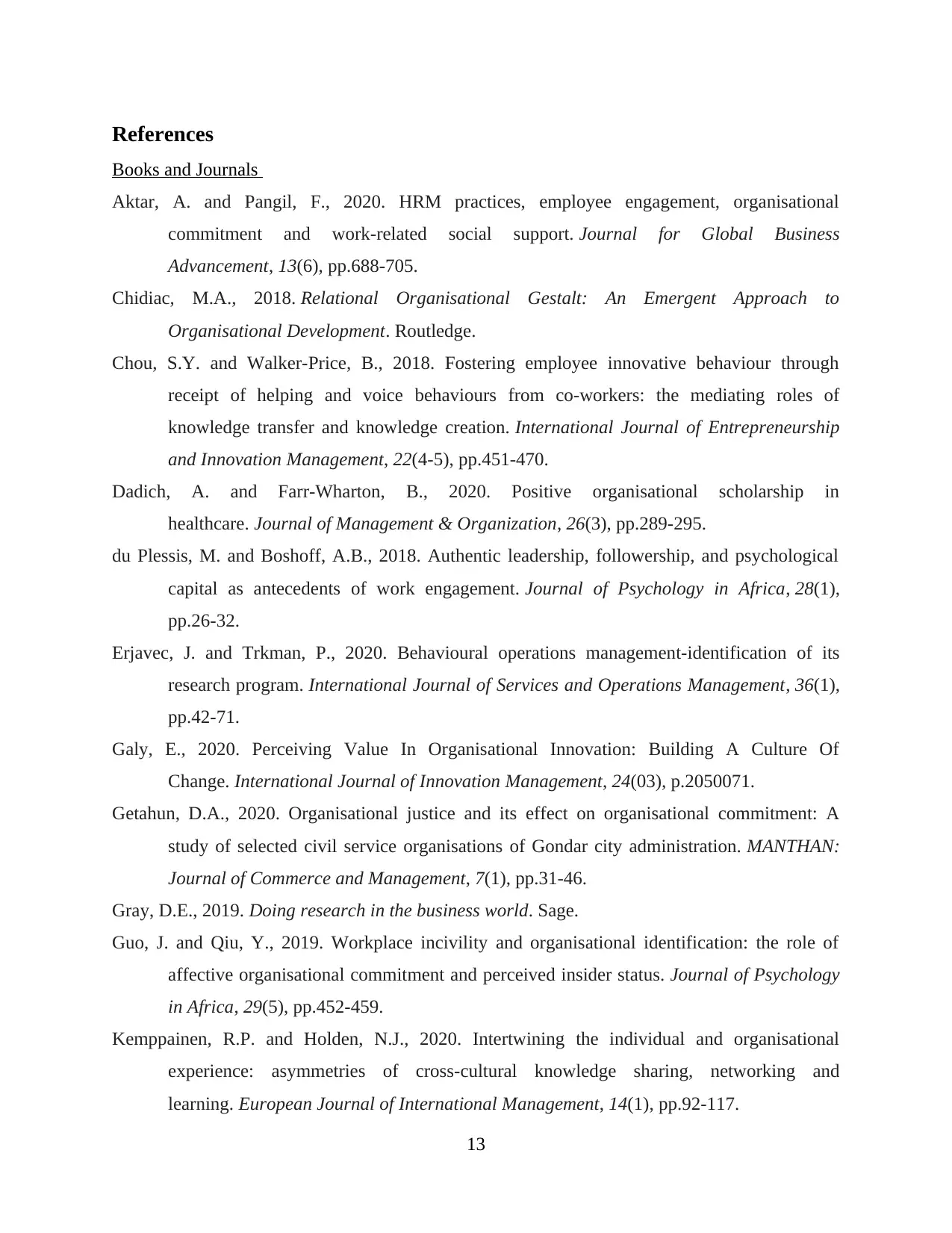
References
Books and Journals
Aktar, A. and Pangil, F., 2020. HRM practices, employee engagement, organisational
commitment and work-related social support. Journal for Global Business
Advancement, 13(6), pp.688-705.
Chidiac, M.A., 2018. Relational Organisational Gestalt: An Emergent Approach to
Organisational Development. Routledge.
Chou, S.Y. and Walker-Price, B., 2018. Fostering employee innovative behaviour through
receipt of helping and voice behaviours from co-workers: the mediating roles of
knowledge transfer and knowledge creation. International Journal of Entrepreneurship
and Innovation Management, 22(4-5), pp.451-470.
Dadich, A. and Farr-Wharton, B., 2020. Positive organisational scholarship in
healthcare. Journal of Management & Organization, 26(3), pp.289-295.
du Plessis, M. and Boshoff, A.B., 2018. Authentic leadership, followership, and psychological
capital as antecedents of work engagement. Journal of Psychology in Africa, 28(1),
pp.26-32.
Erjavec, J. and Trkman, P., 2020. Behavioural operations management-identification of its
research program. International Journal of Services and Operations Management, 36(1),
pp.42-71.
Galy, E., 2020. Perceiving Value In Organisational Innovation: Building A Culture Of
Change. International Journal of Innovation Management, 24(03), p.2050071.
Getahun, D.A., 2020. Organisational justice and its effect on organisational commitment: A
study of selected civil service organisations of Gondar city administration. MANTHAN:
Journal of Commerce and Management, 7(1), pp.31-46.
Gray, D.E., 2019. Doing research in the business world. Sage.
Guo, J. and Qiu, Y., 2019. Workplace incivility and organisational identification: the role of
affective organisational commitment and perceived insider status. Journal of Psychology
in Africa, 29(5), pp.452-459.
Kemppainen, R.P. and Holden, N.J., 2020. Intertwining the individual and organisational
experience: asymmetries of cross-cultural knowledge sharing, networking and
learning. European Journal of International Management, 14(1), pp.92-117.
13
Books and Journals
Aktar, A. and Pangil, F., 2020. HRM practices, employee engagement, organisational
commitment and work-related social support. Journal for Global Business
Advancement, 13(6), pp.688-705.
Chidiac, M.A., 2018. Relational Organisational Gestalt: An Emergent Approach to
Organisational Development. Routledge.
Chou, S.Y. and Walker-Price, B., 2018. Fostering employee innovative behaviour through
receipt of helping and voice behaviours from co-workers: the mediating roles of
knowledge transfer and knowledge creation. International Journal of Entrepreneurship
and Innovation Management, 22(4-5), pp.451-470.
Dadich, A. and Farr-Wharton, B., 2020. Positive organisational scholarship in
healthcare. Journal of Management & Organization, 26(3), pp.289-295.
du Plessis, M. and Boshoff, A.B., 2018. Authentic leadership, followership, and psychological
capital as antecedents of work engagement. Journal of Psychology in Africa, 28(1),
pp.26-32.
Erjavec, J. and Trkman, P., 2020. Behavioural operations management-identification of its
research program. International Journal of Services and Operations Management, 36(1),
pp.42-71.
Galy, E., 2020. Perceiving Value In Organisational Innovation: Building A Culture Of
Change. International Journal of Innovation Management, 24(03), p.2050071.
Getahun, D.A., 2020. Organisational justice and its effect on organisational commitment: A
study of selected civil service organisations of Gondar city administration. MANTHAN:
Journal of Commerce and Management, 7(1), pp.31-46.
Gray, D.E., 2019. Doing research in the business world. Sage.
Guo, J. and Qiu, Y., 2019. Workplace incivility and organisational identification: the role of
affective organisational commitment and perceived insider status. Journal of Psychology
in Africa, 29(5), pp.452-459.
Kemppainen, R.P. and Holden, N.J., 2020. Intertwining the individual and organisational
experience: asymmetries of cross-cultural knowledge sharing, networking and
learning. European Journal of International Management, 14(1), pp.92-117.
13
Paraphrase This Document
Need a fresh take? Get an instant paraphrase of this document with our AI Paraphraser
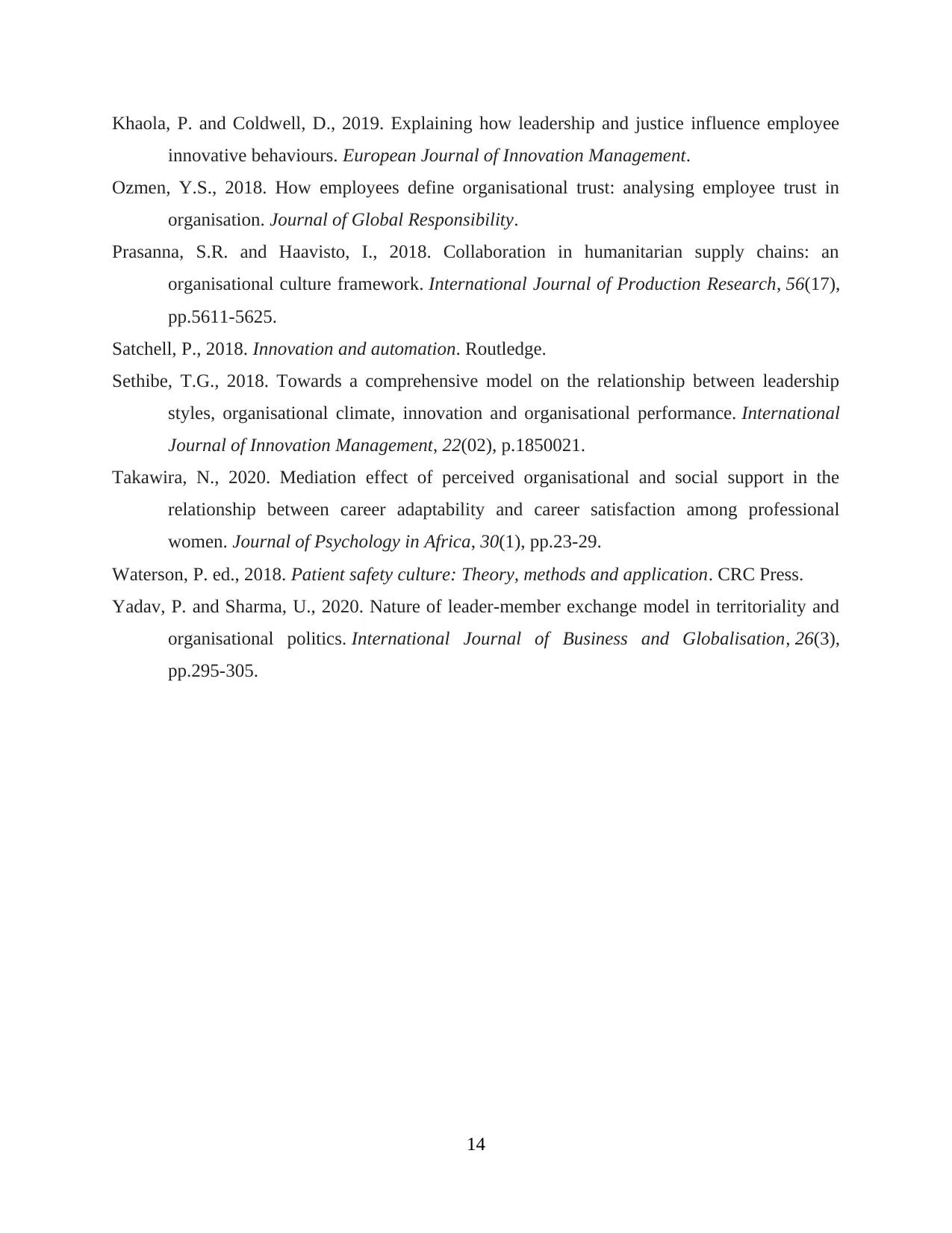
Khaola, P. and Coldwell, D., 2019. Explaining how leadership and justice influence employee
innovative behaviours. European Journal of Innovation Management.
Ozmen, Y.S., 2018. How employees define organisational trust: analysing employee trust in
organisation. Journal of Global Responsibility.
Prasanna, S.R. and Haavisto, I., 2018. Collaboration in humanitarian supply chains: an
organisational culture framework. International Journal of Production Research, 56(17),
pp.5611-5625.
Satchell, P., 2018. Innovation and automation. Routledge.
Sethibe, T.G., 2018. Towards a comprehensive model on the relationship between leadership
styles, organisational climate, innovation and organisational performance. International
Journal of Innovation Management, 22(02), p.1850021.
Takawira, N., 2020. Mediation effect of perceived organisational and social support in the
relationship between career adaptability and career satisfaction among professional
women. Journal of Psychology in Africa, 30(1), pp.23-29.
Waterson, P. ed., 2018. Patient safety culture: Theory, methods and application. CRC Press.
Yadav, P. and Sharma, U., 2020. Nature of leader-member exchange model in territoriality and
organisational politics. International Journal of Business and Globalisation, 26(3),
pp.295-305.
14
innovative behaviours. European Journal of Innovation Management.
Ozmen, Y.S., 2018. How employees define organisational trust: analysing employee trust in
organisation. Journal of Global Responsibility.
Prasanna, S.R. and Haavisto, I., 2018. Collaboration in humanitarian supply chains: an
organisational culture framework. International Journal of Production Research, 56(17),
pp.5611-5625.
Satchell, P., 2018. Innovation and automation. Routledge.
Sethibe, T.G., 2018. Towards a comprehensive model on the relationship between leadership
styles, organisational climate, innovation and organisational performance. International
Journal of Innovation Management, 22(02), p.1850021.
Takawira, N., 2020. Mediation effect of perceived organisational and social support in the
relationship between career adaptability and career satisfaction among professional
women. Journal of Psychology in Africa, 30(1), pp.23-29.
Waterson, P. ed., 2018. Patient safety culture: Theory, methods and application. CRC Press.
Yadav, P. and Sharma, U., 2020. Nature of leader-member exchange model in territoriality and
organisational politics. International Journal of Business and Globalisation, 26(3),
pp.295-305.
14
1 out of 17
Related Documents
Your All-in-One AI-Powered Toolkit for Academic Success.
+13062052269
info@desklib.com
Available 24*7 on WhatsApp / Email
![[object Object]](/_next/static/media/star-bottom.7253800d.svg)
Unlock your academic potential
© 2024 | Zucol Services PVT LTD | All rights reserved.




